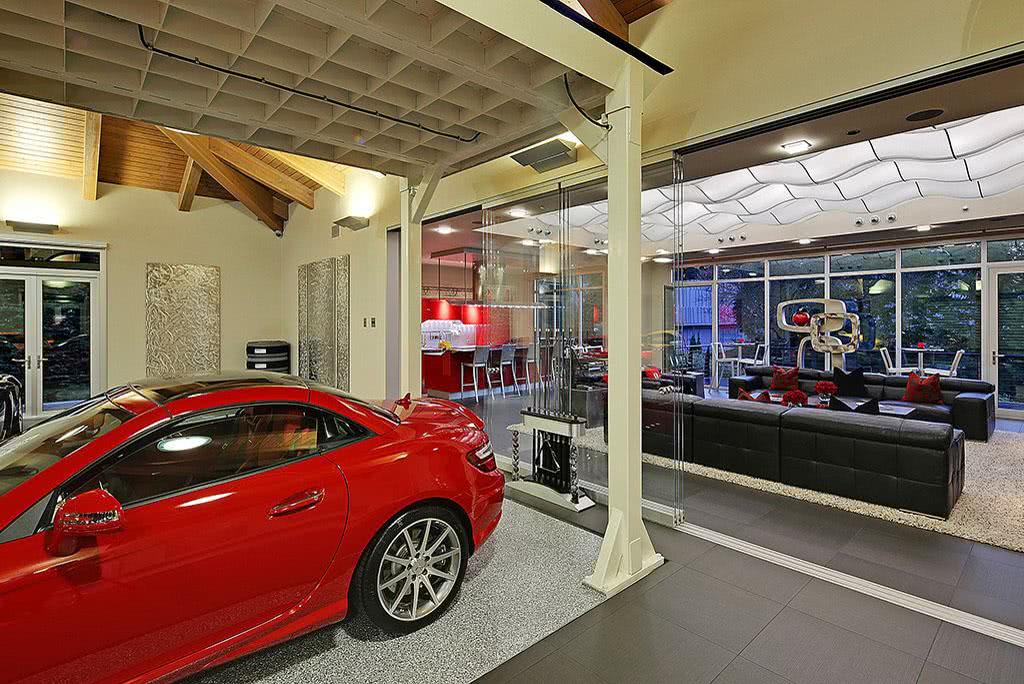Choosing the floor for an indoor or outdoor garage requires a careful assessment of the architectural design – the quality and durability of the materials are requirements that must be taken into account so as not to be frustrated after the choice.
In modern projects, the garage does not only play the role of protecting automobiles and motorcycles – they can be an environment for storing diverse items, in addition to tools. The garage can still be a convivial place, and in some projects, they advance over the residential entrance and even in the entrance hall or the living room.
Collectors give all the value to this place, to protect and highlight their valuable items, but this is a specific occasion.
Discover the main types of garage floors
The types of floors for the garage vary dramatically, with different materials and different applications, there is always one that can suit your project. Discover now the main types of garage floors with visual references:
Tiled floor
The ceramic floor offers enough resistance to constant traffic in the environment, as is the case with automobiles. For being versatile, they have different paginations, in addition to being an easy to clean material, it does not stain and is usually one of the most economical options on the market.
Picture 1 – Garage with smooth ceramic floor.
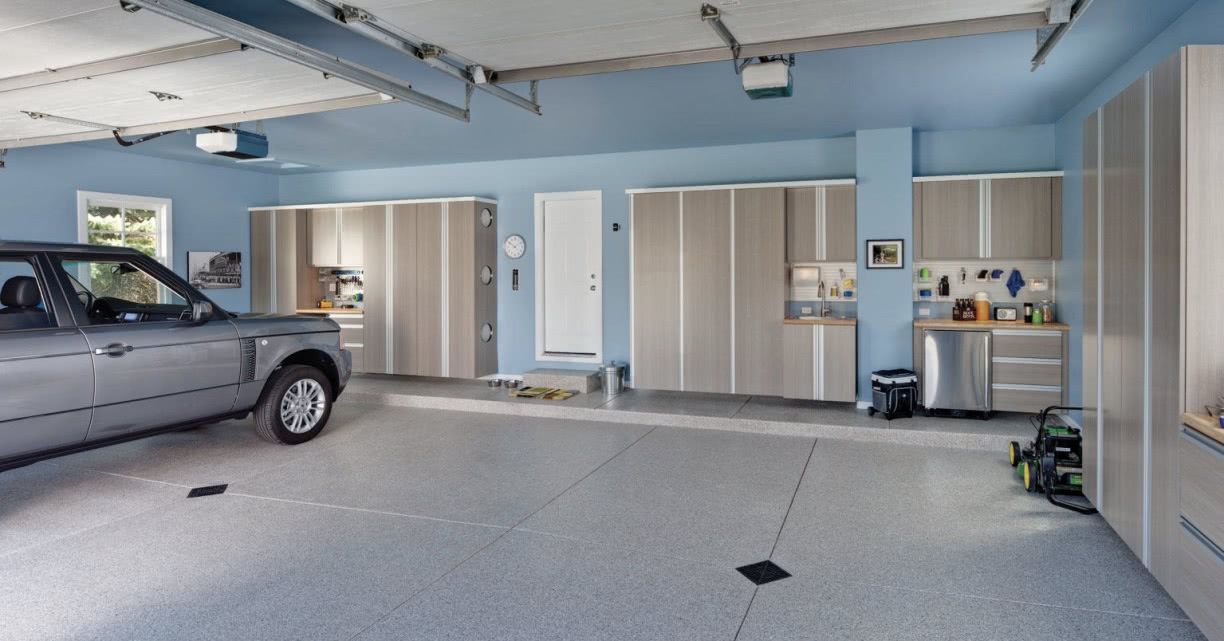
Image 2 – Simple ceramics for garage.
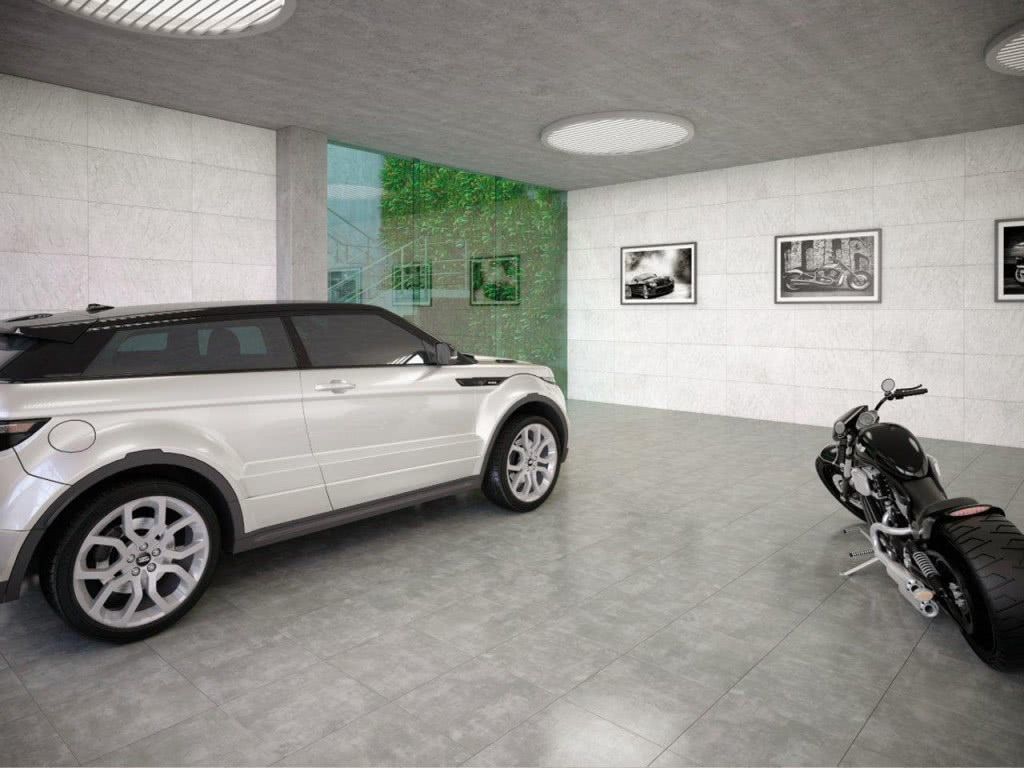
Porcelain tiles floor
Porcelain tiles are one of the darlings when it comes to flooring! They have a very wide market, so you can choose the model that best suits your style and the environment.
Picture 3 – Garage with concrete porcelain floor.
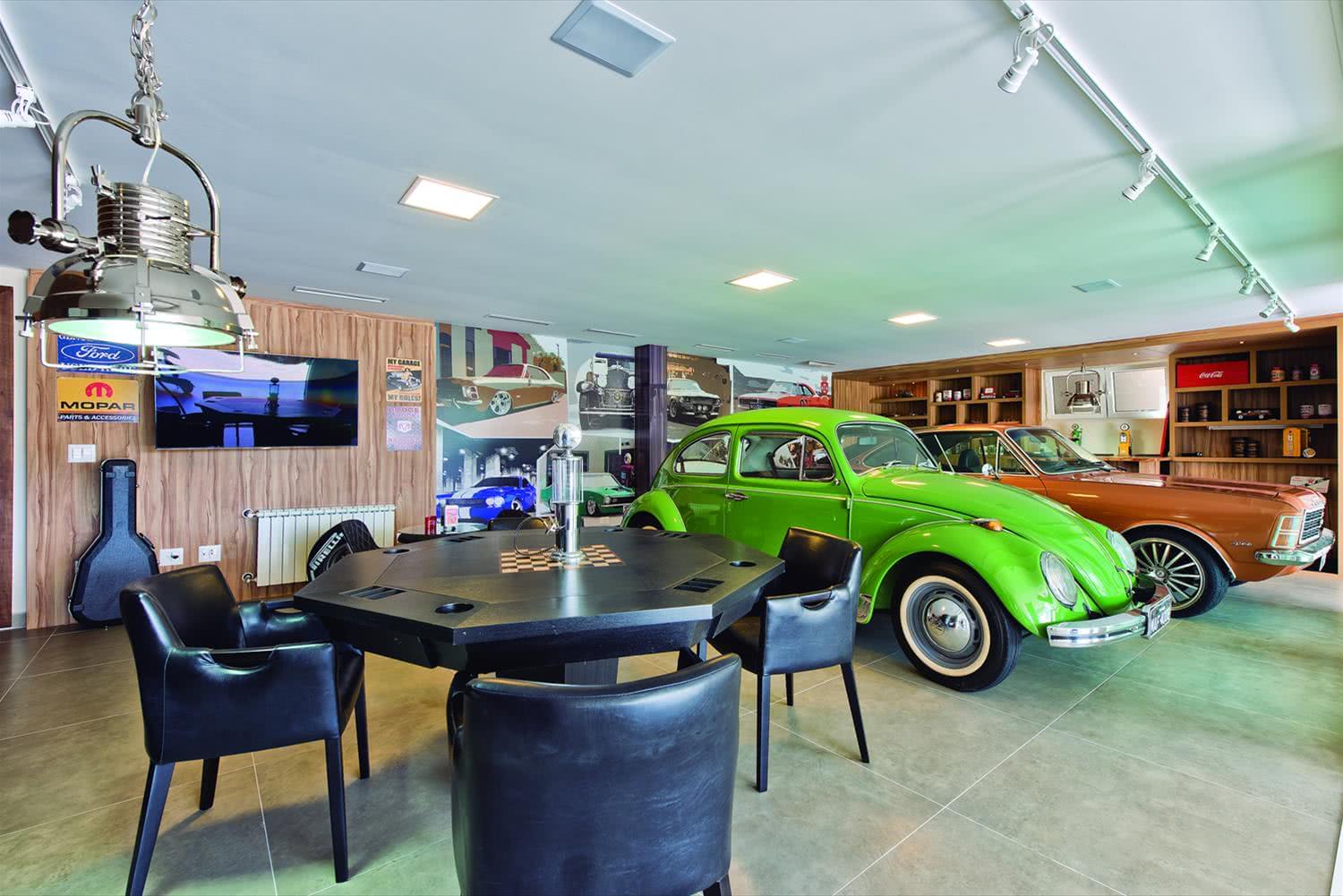
In this garage, the trend of burnt cement invaded the plates and covered the entire garage area!
Image 4 – For integrated environments, prefer ceramic or porcelain tiles.
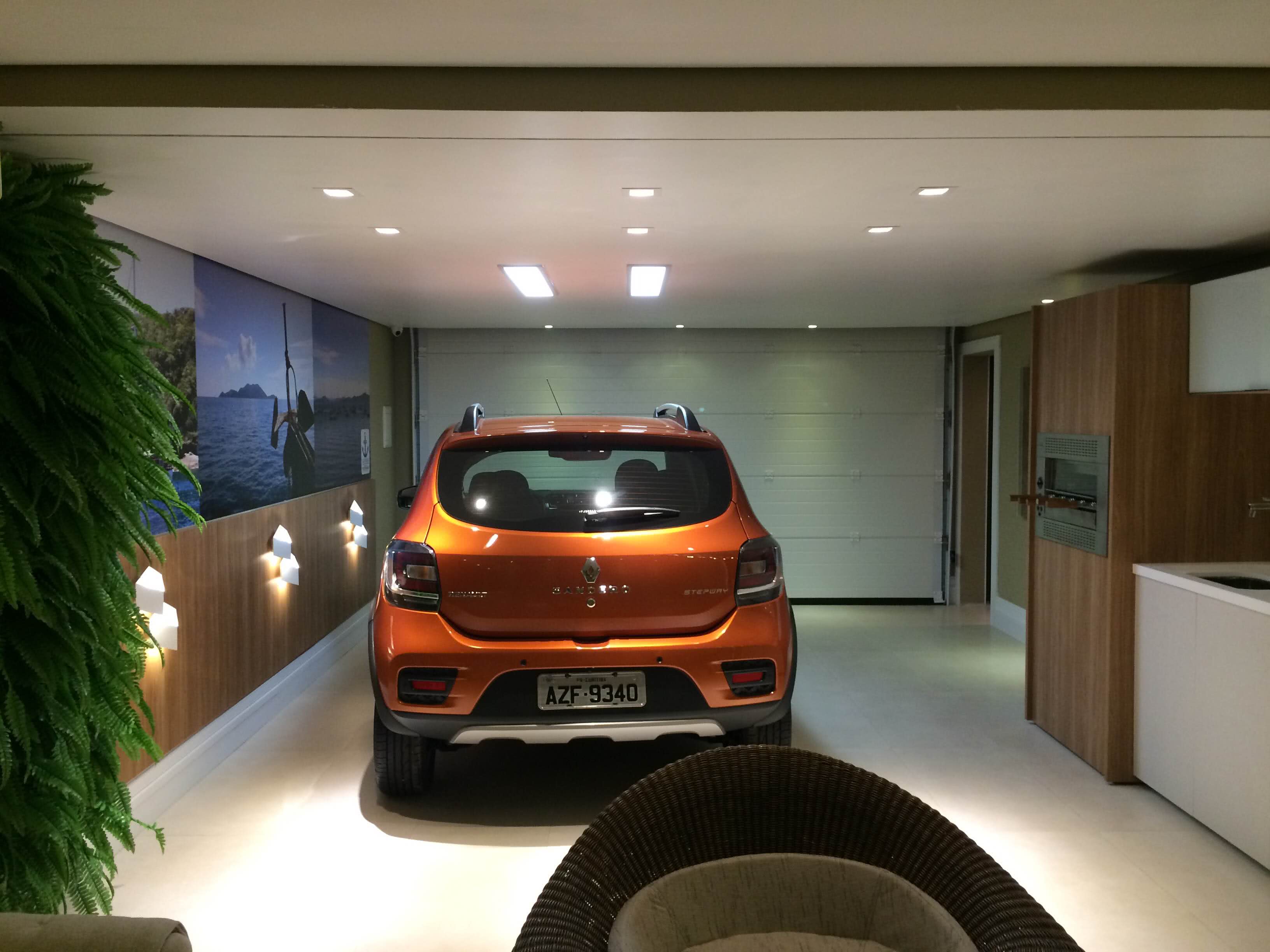
It is sold in plate format and is usually more expensive than traditional ceramics. However with a multitude of textures.
Polished porcelain flooring
The porcelain floor offers a more beautiful and sophisticated look in the closed environment, allowing for a variety of different colors and textures. At the time of choice, prefer the enamels that are more resistant.
Picture 5 – Garage with polished porcelain floor.
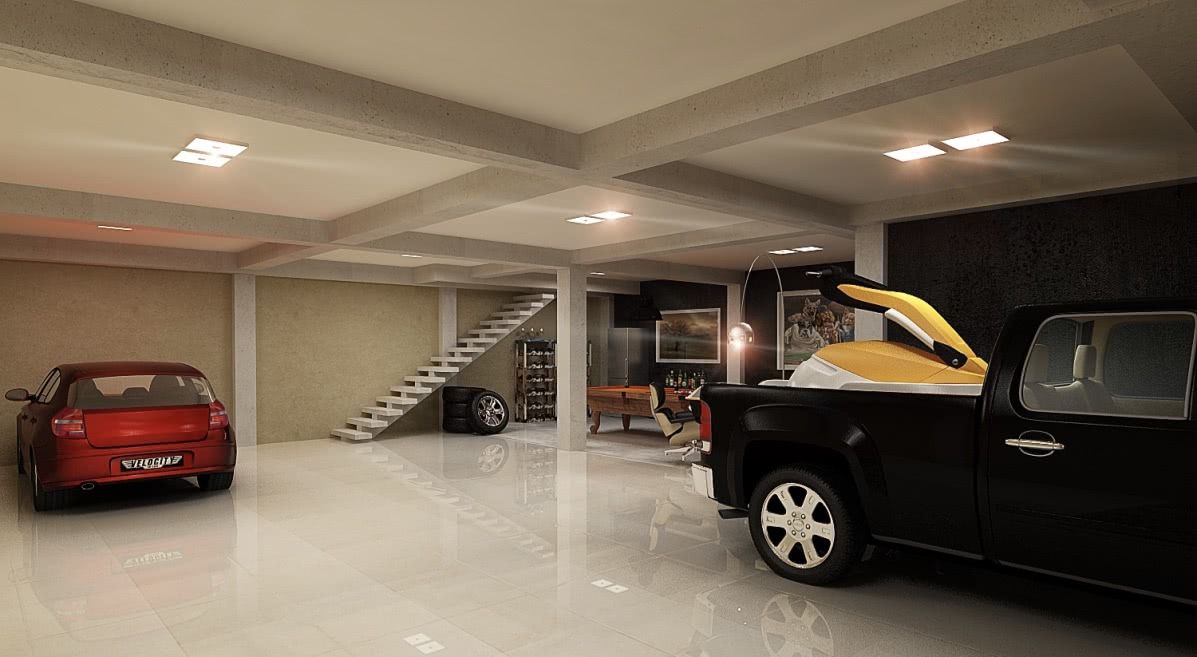
Concrete floor
Image 6 – The smooth concrete floor can be finished in burnt cement.
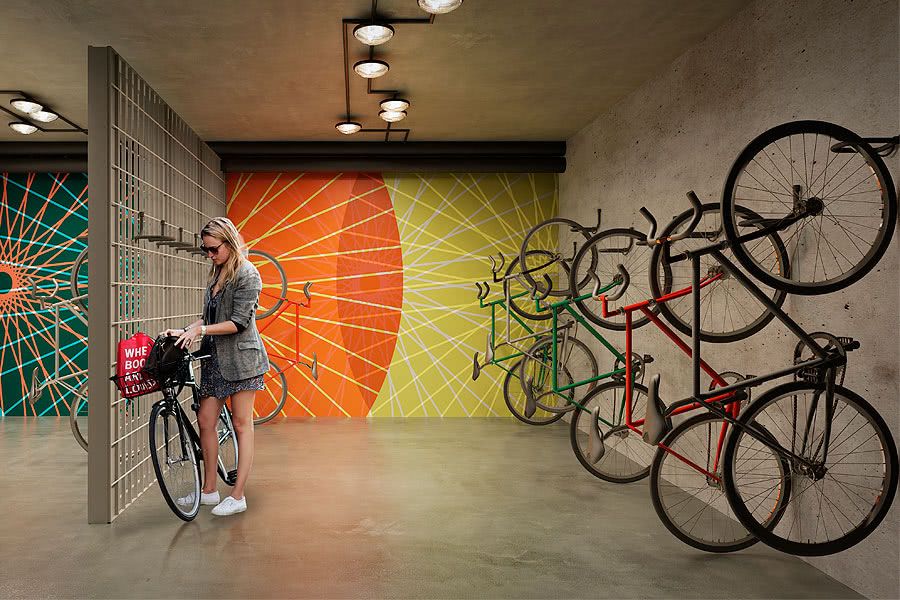
Image 7 – Concrete floor for garage.
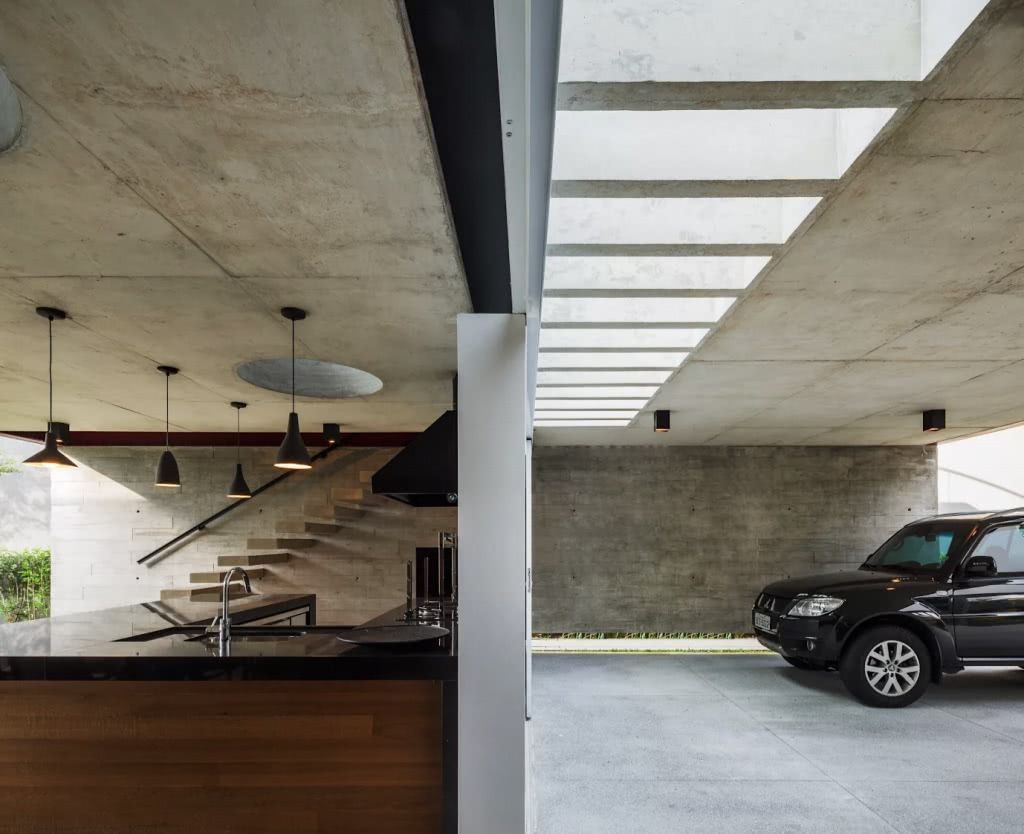
Vinyl flooring
Image 8 – Vinyl floors are a great option to have the checkered effect.
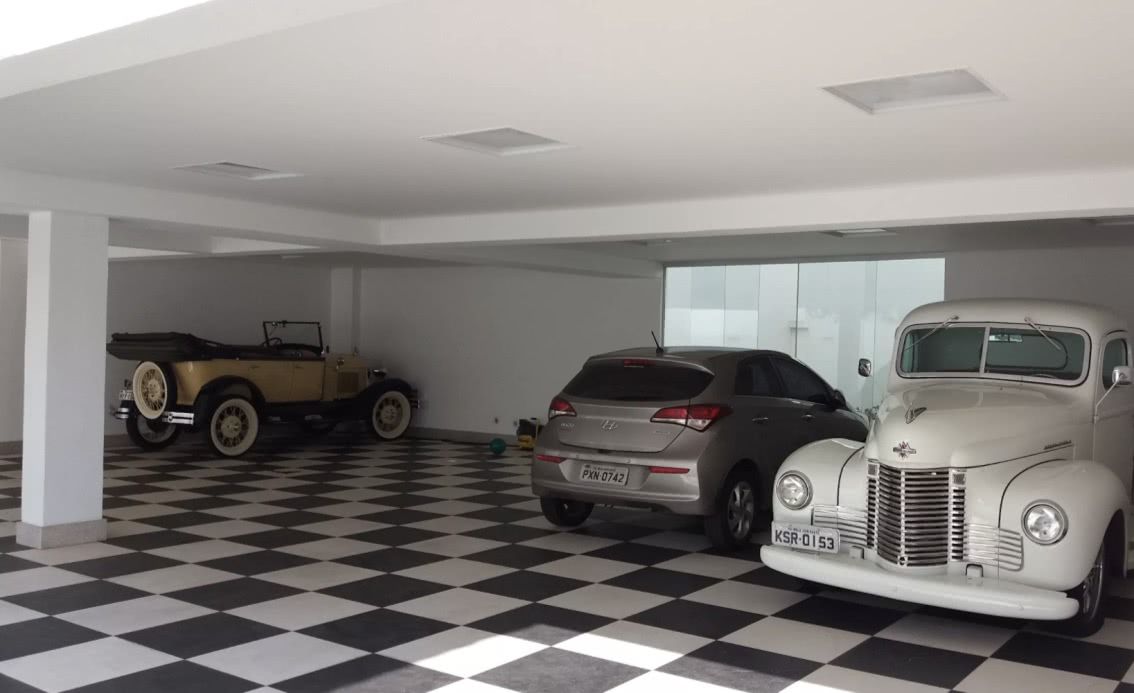
Modular vinyl flooring
Image 9 – Modular vinyl coating.
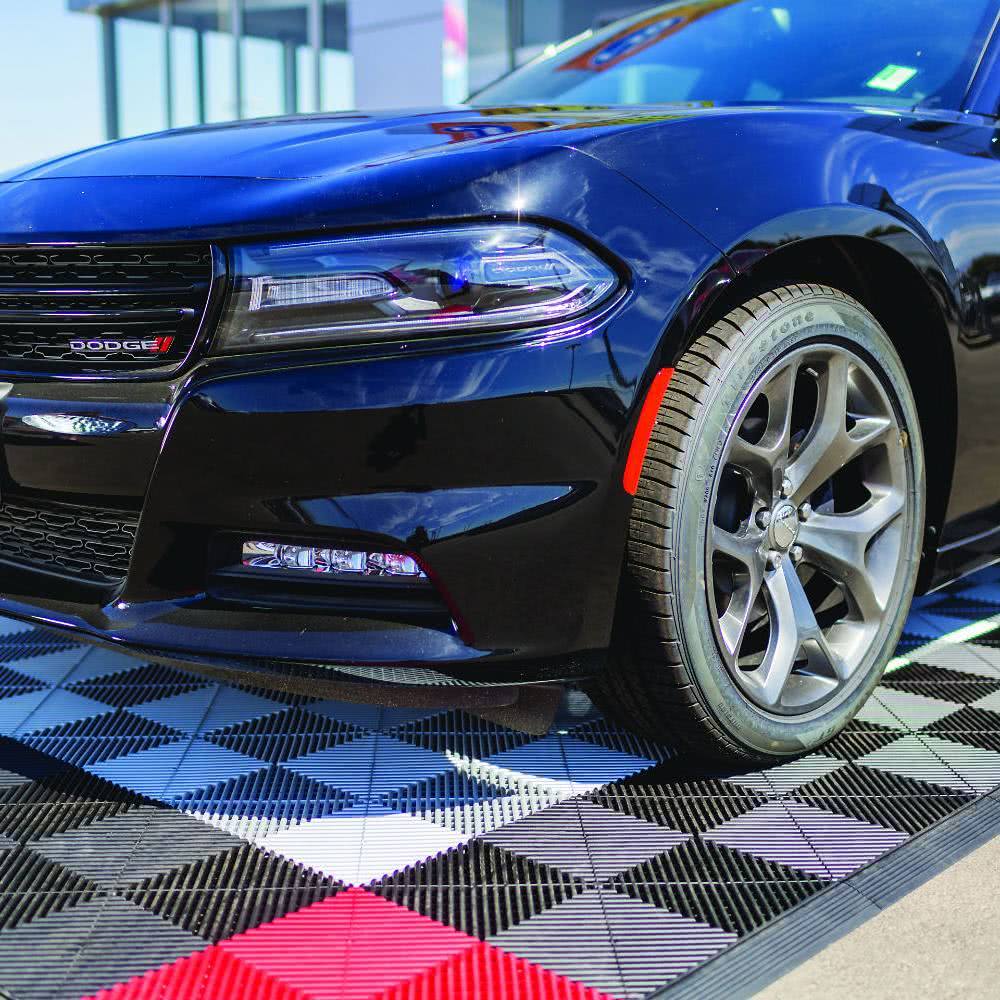
This American brand, Swisstrax, offers a different material for the garage floor. Made with UV stabilizers, they are highly resistant and support high car weights, as well as being easy to maintain.
Image 10 – Personalize your garage floor.
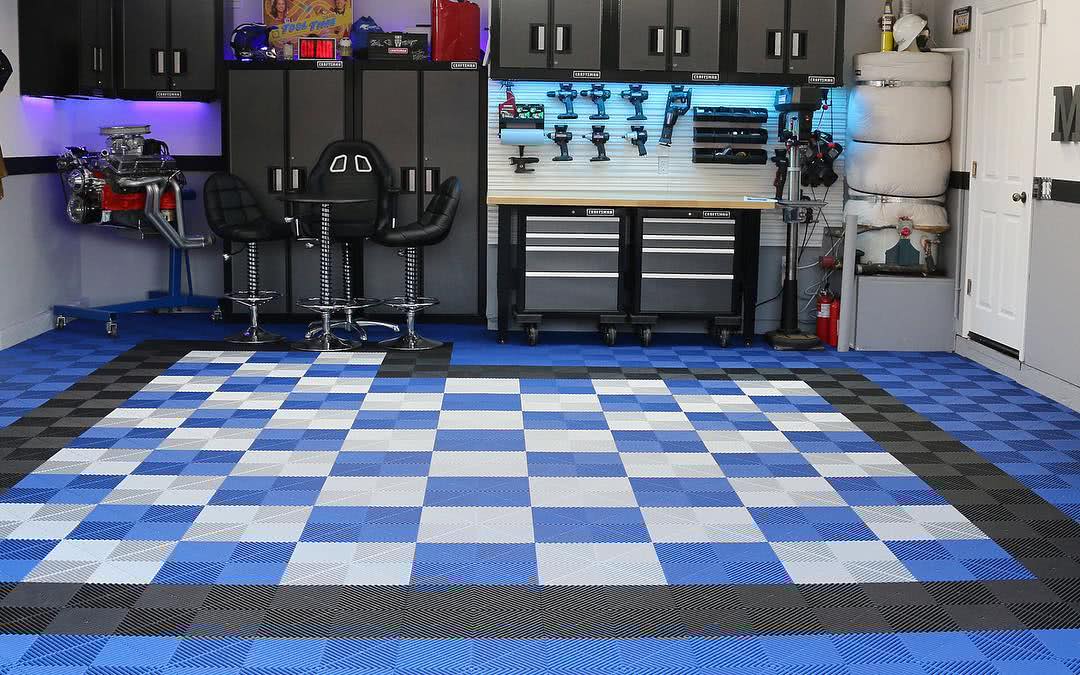
They are modular tiles with an availability in 19 colors, so it is possible to create designs forming a creative and original composition for the garage.
Rubber floor
Image 11 – The rubber floor has a practical solution that unites beauty, economy and has easy installation.
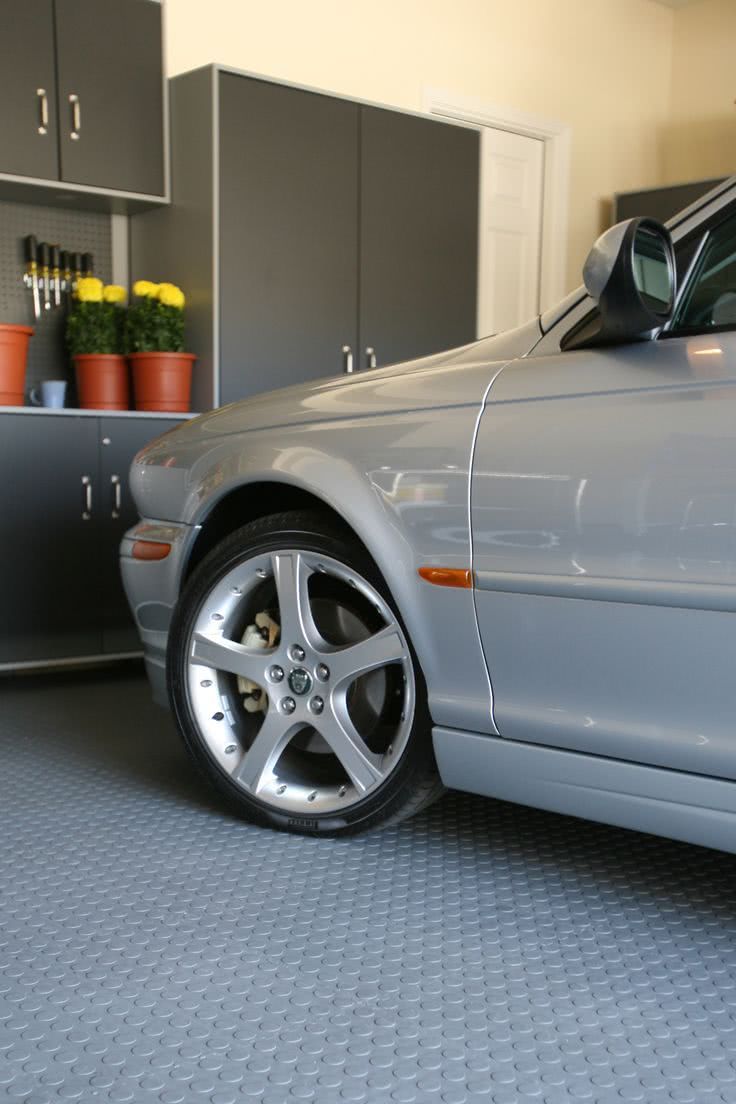
Rubber floors are produced from PVC recycling, with a coin-style design (various circumferences in appearance). They also reduce labor time with easy installation and are ideal for busy locations.
Fulget flooring
Also known as washed or polished granilite, fulget is a cement-based floor, with different granules of crushed stones and can be worked with custom colors and compositions. As it has a rough and non-slip texture, it can be applied to external areas such as sidewalks, garages and swimming pools.
Picture 12 – Garage with floor in fulget.
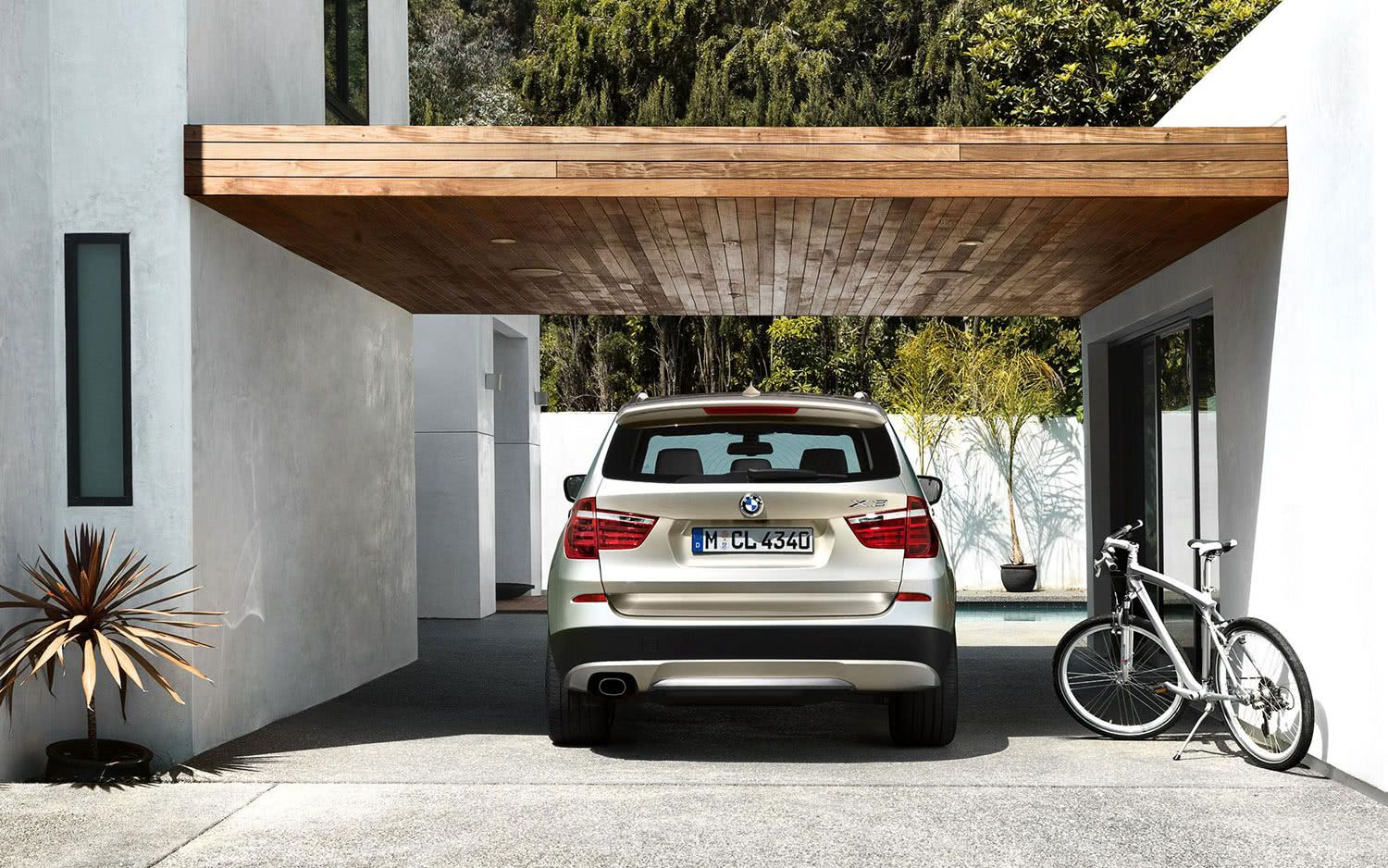
Epoxy flooring
Epoxy is a resin applied to the floor that offers different colors and shades to meet the proposal of each project. The epoxy floor has strong resistance, high durability, practicality in cleaning and quick installation. It is common to find in commercial garages such as shopping malls, gyms, supermarkets and even residential developments.
Image 13 – The monolithic floor (without seams) facilitates the demarcation of spaces and the signaling of accesses.
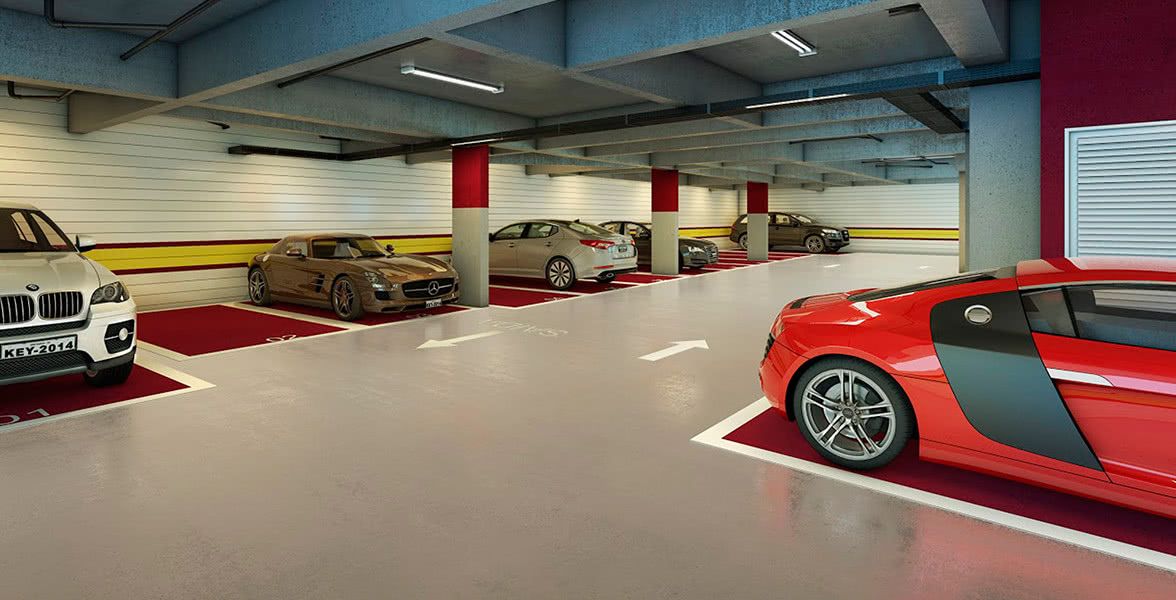
Picture 14 – The epoxy floor is a model that is in high decor and can line your internal garage.
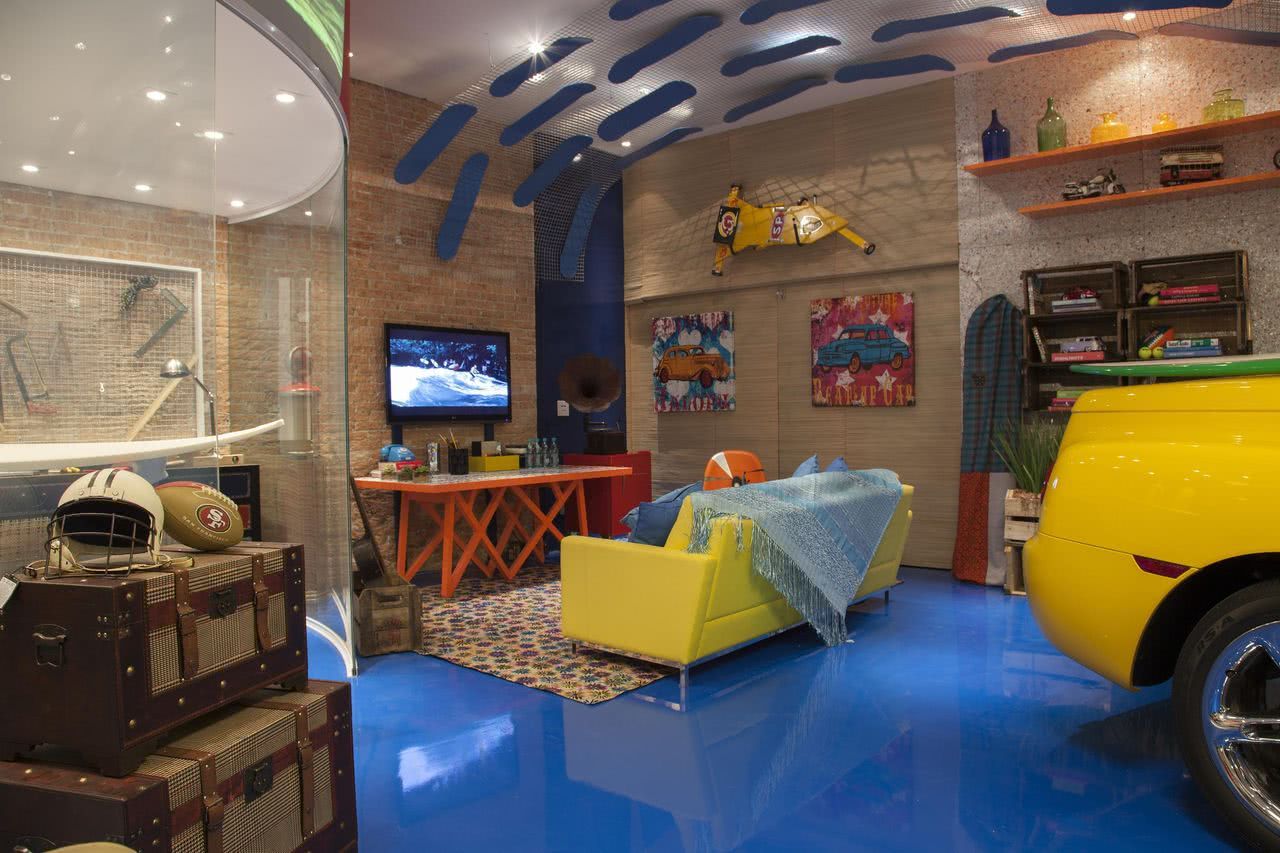
Stone floor
Picture 15 – Garage with stone floor.
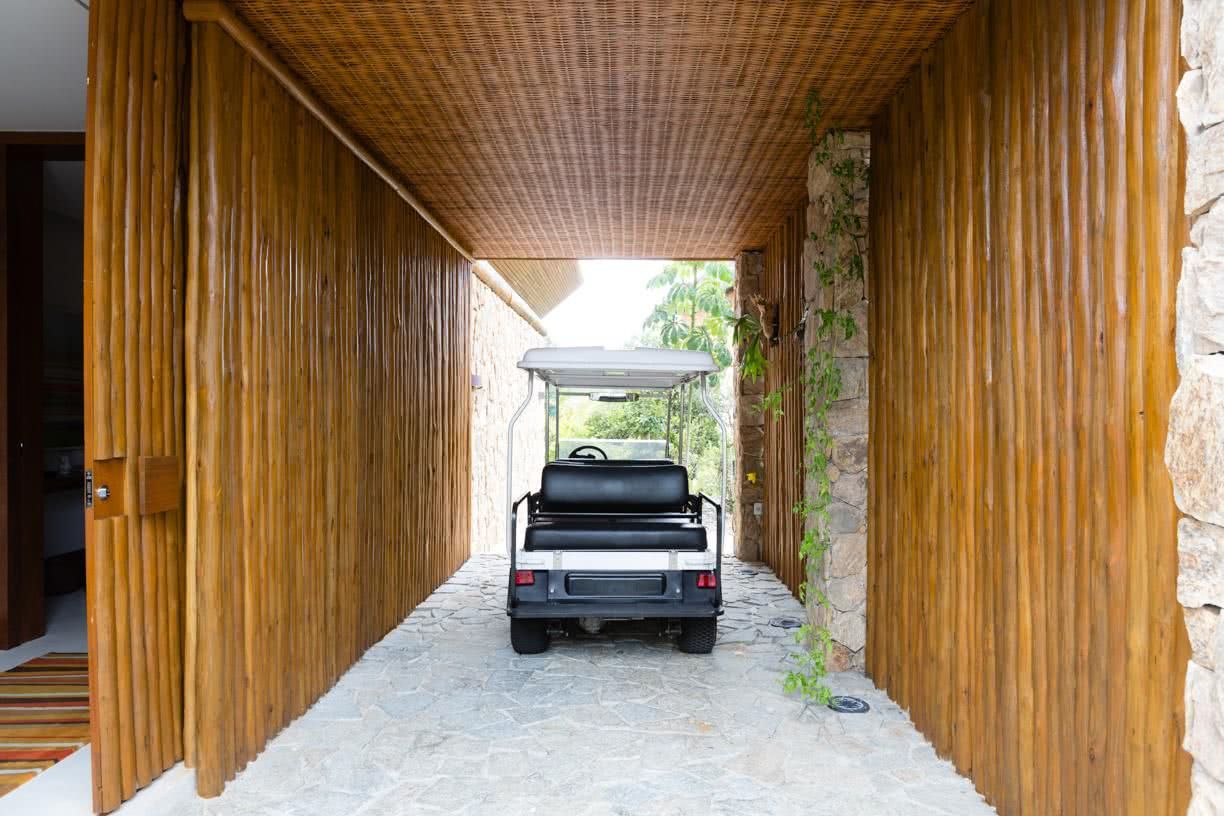
The stone floor is resistant and makes the garage more elegant and sophisticated, being a good alternative, especially when well placed (avoiding unevenness).
Picture 16 – Garage with stone floor from Minas Gerais.
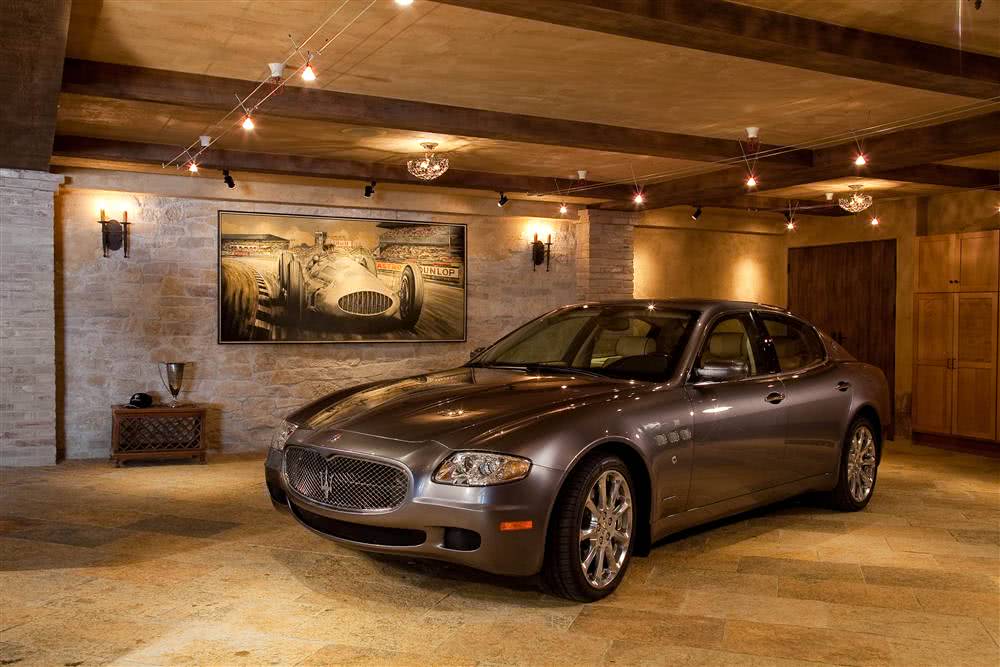
Mineira stone, the one usually found around swimming pools, is an option to cover the garage floor, however, it has a higher cost than other materials. See that in this project the stone combined with the details of the wood of the rafters, door and furniture.
Image 17 – The mosaic of stones on the floor form a beautiful design and still leave the urban touch to the interior of your garage.
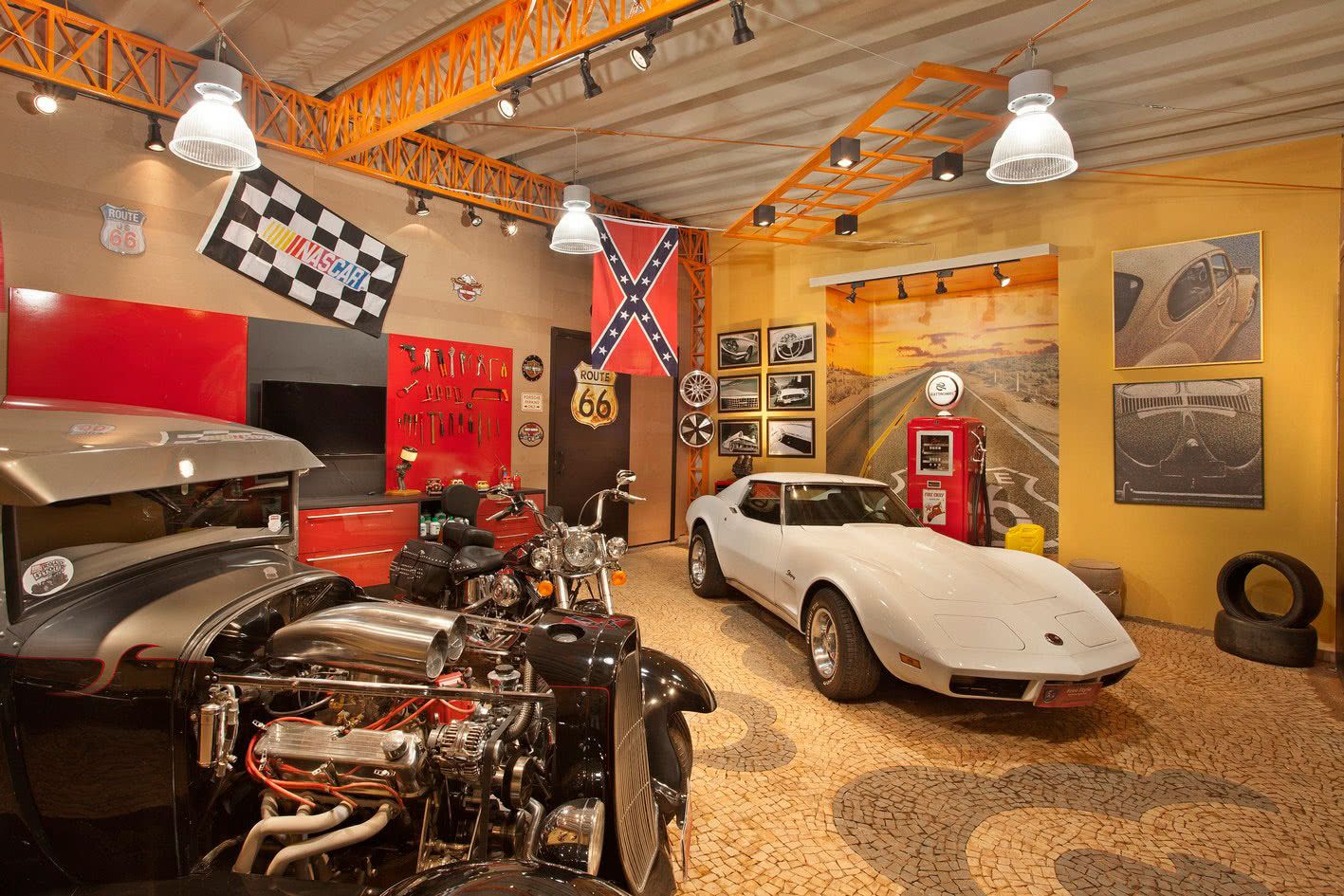
Interlocked floor
Image 18 – The interlocking floors are the most suitable for outdoor areas.
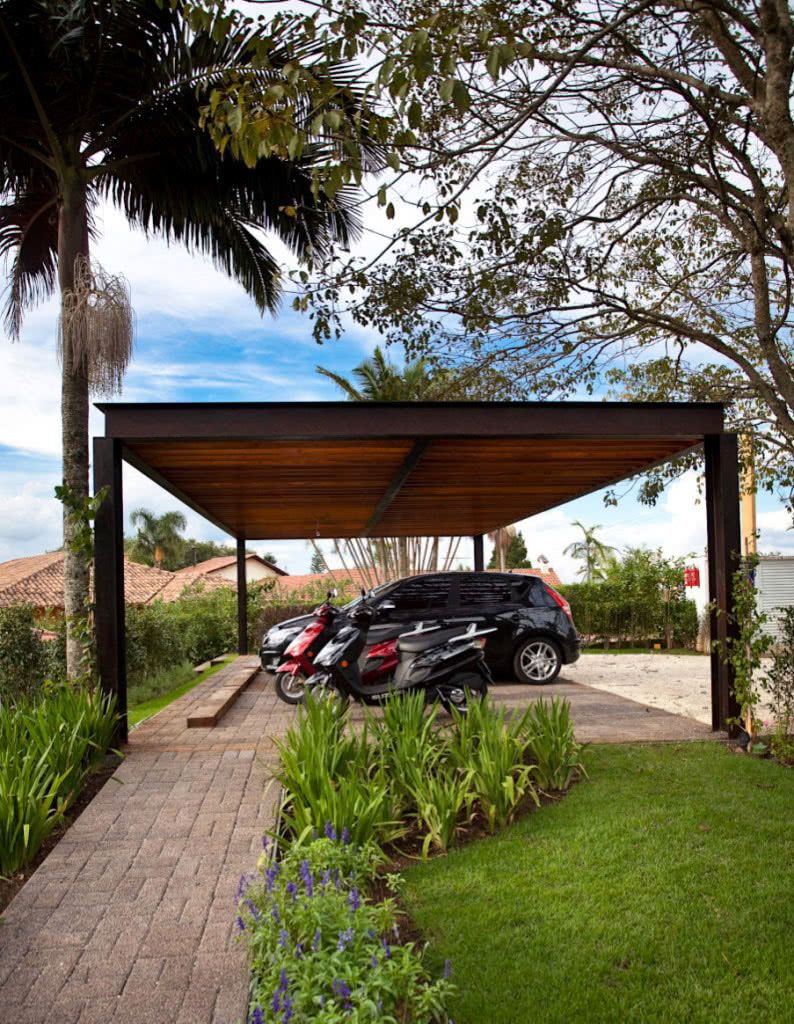
The interlocking floor is widely used in sidewalks and urban spaces, so it is a great option for open garages. This type of coating consists of concrete pieces produced in different colors and shapes that fit together, forming a composition on the floor. They are resistant, non-slip, easy to maintain and drain rainwater avoiding puddles.
Concregram
Concregram is a concrete floor that allows the cultivation of grass and is highly draining. They are usually placed at the garage entrance, as they offer a more beautiful look on the facade, but neither do they need to build an external space with this type of floor.
Image 19 – The concregram floor is one of the most used for garage entries.
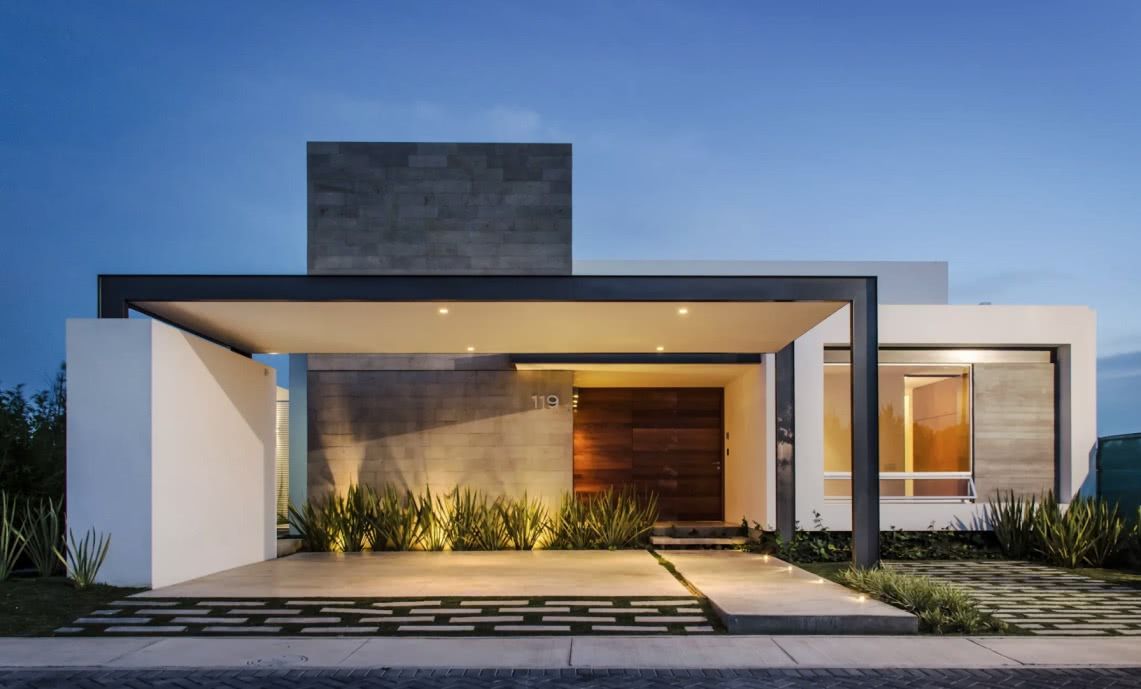
Picture 20 – This garage has two floor models: concregram and rubberized tile.
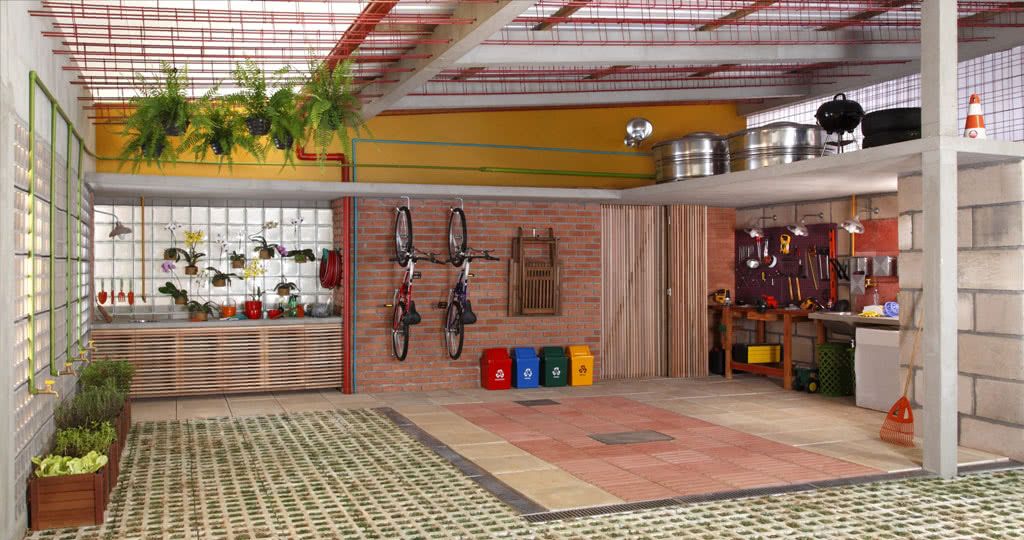
Image 21 – Concregram in the access determines the landscaping of this house, and in order not to escape the proposal, the choice was for using concrete slabs in the garage.
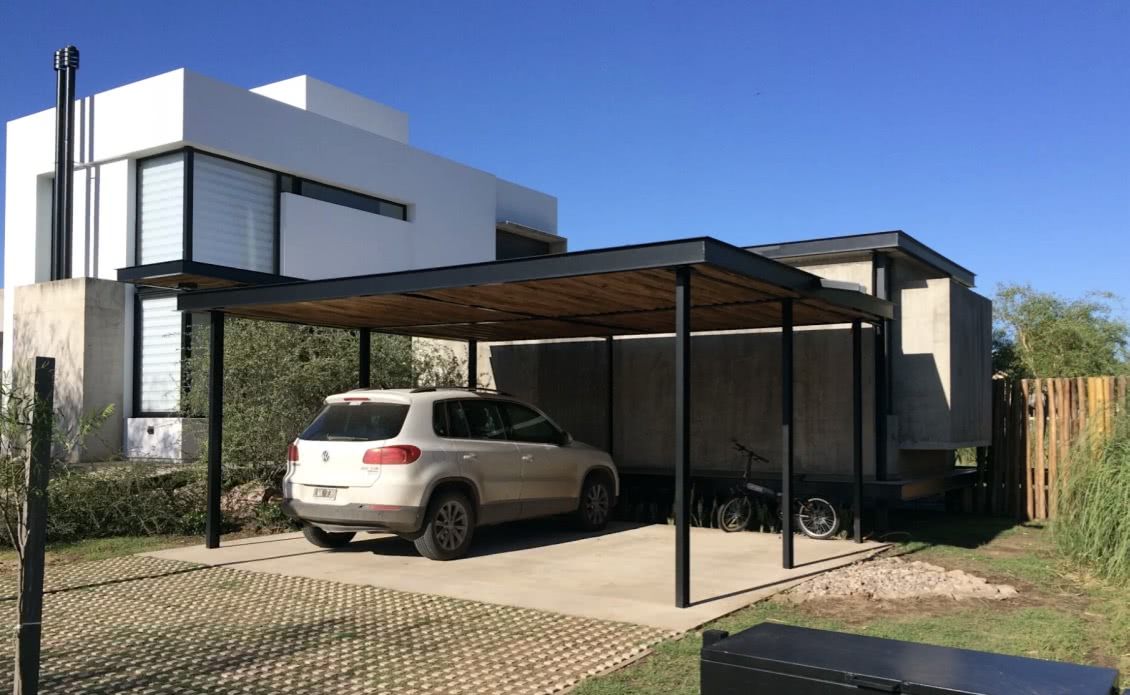
Portuguese stones
Image 22 – As the pergola has open slits, the choice of Portuguese stone on the floor keeps the floor safe and harmonizes with the rest of the other materials in the environment.
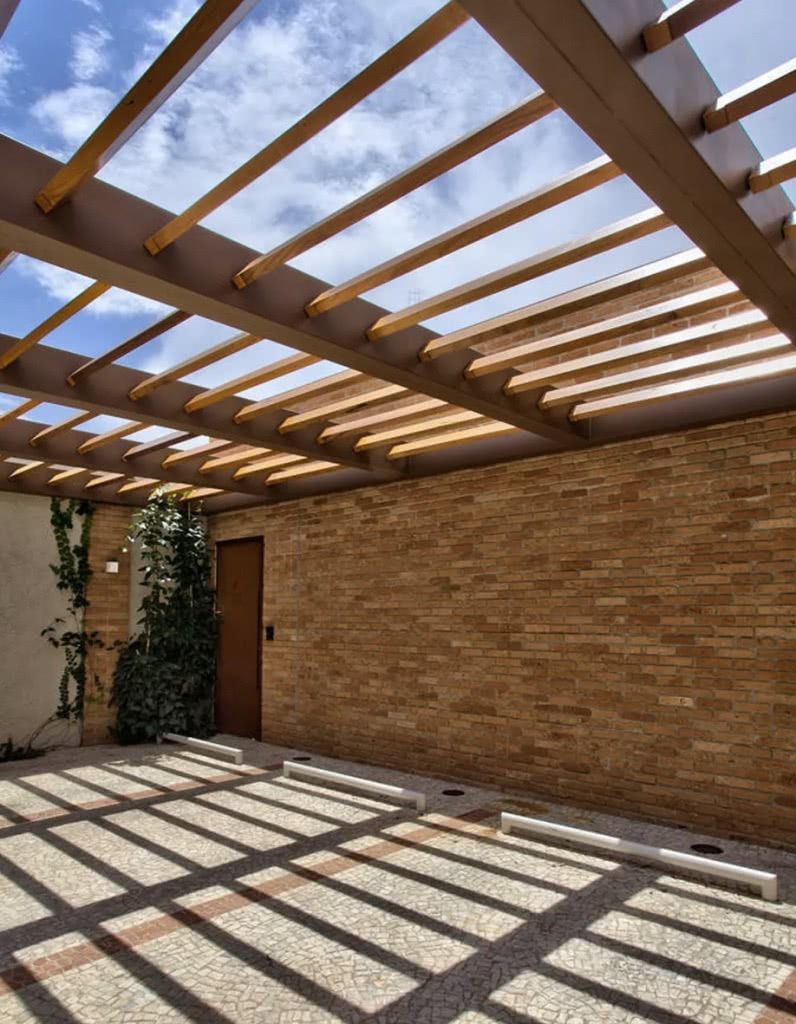
Picture 23 – Garage with Portuguese stone floor.
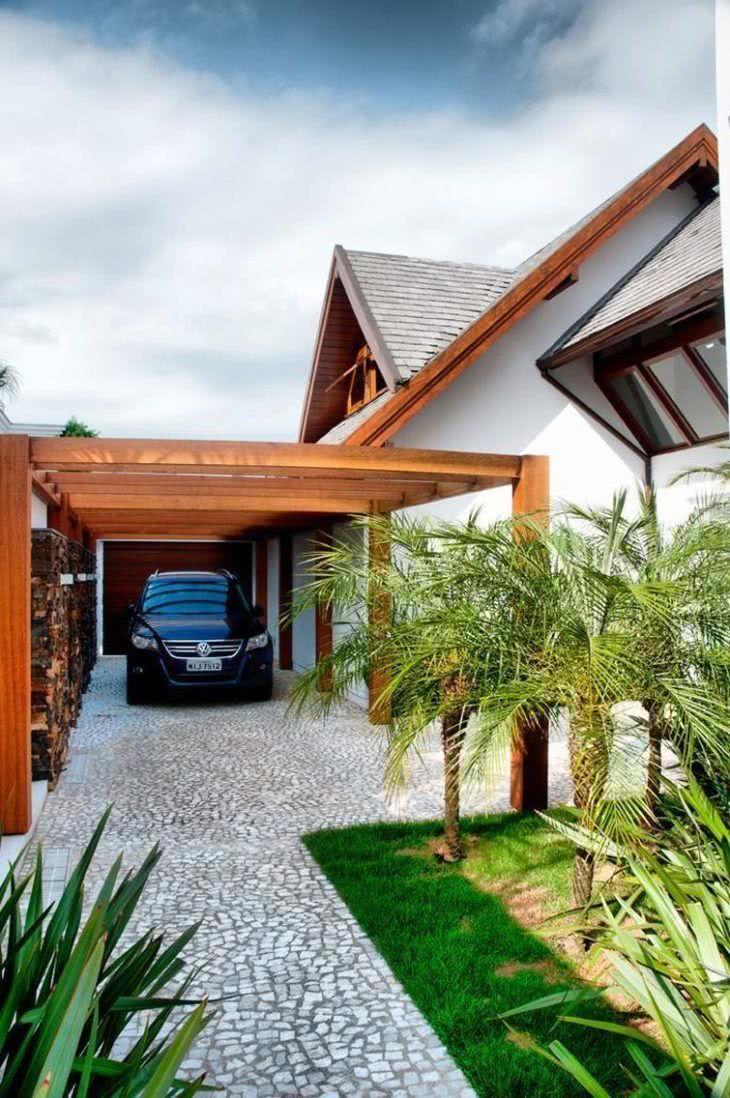
Concrete slabs
This type of floor consists of plates made with concrete applied through expansion joints in which permeable stones can be inserted. It is a suitable floor for open garages, but requires a resin on the surface, to reduce the absorption of oil and moisture.
Image 24 – Concrete slabs are resistant to constant friction in the garage.
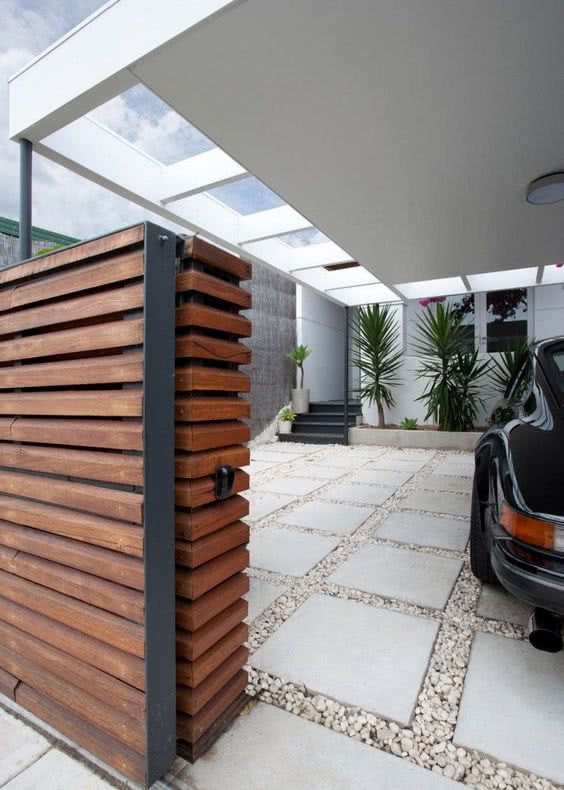
Slate
Picture 25 – As the environment has a more sober decoration, the slate floor fell perfectly.
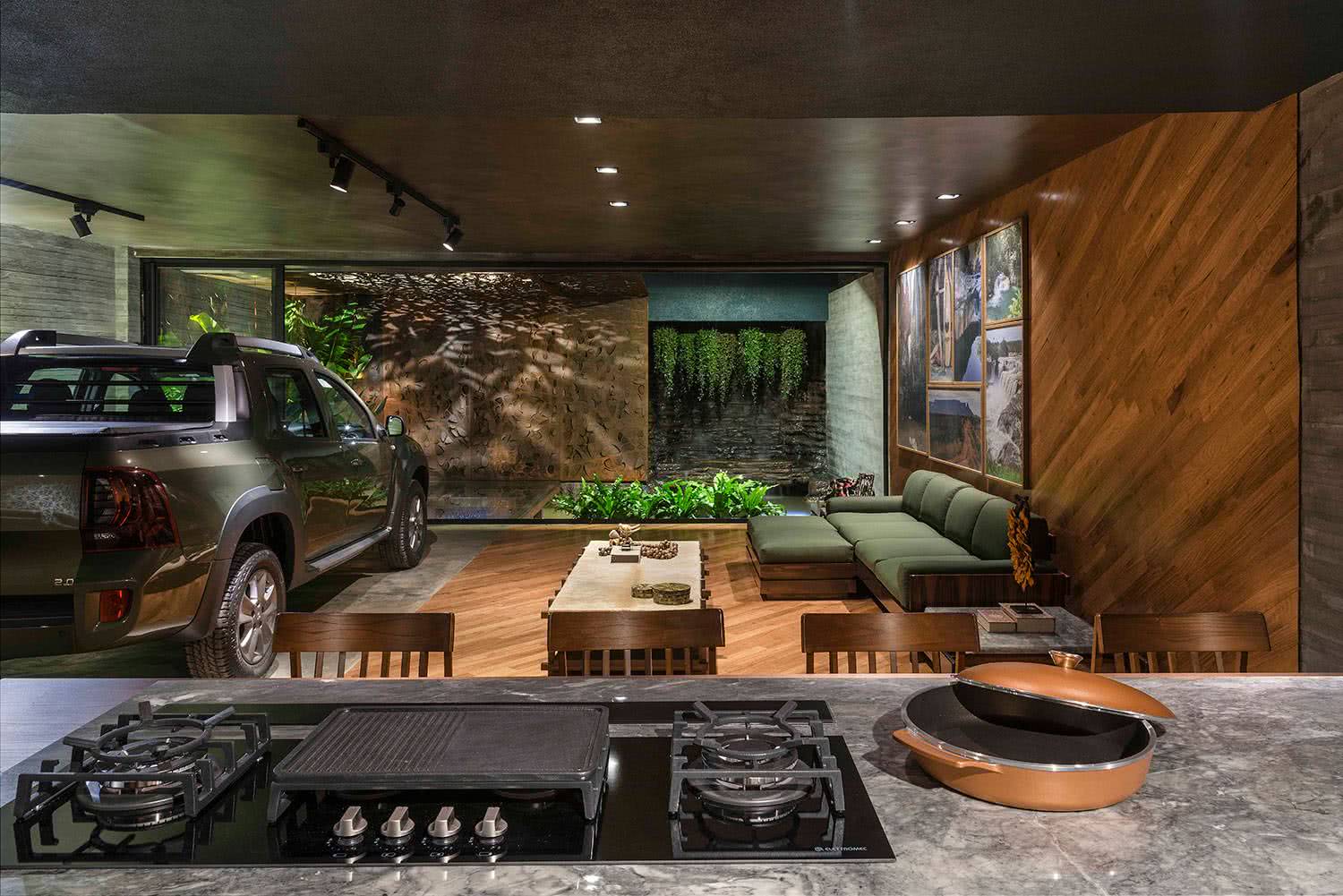
The traditional slate floor can result in a refined environment. In this project, the tiled floor was an elegant and economical option. That is why it is very important to incorporate what the environment already has in a new project, avoiding unnecessary waste.
Rubberized paint
Image 26 – Floor with rubberized paint.
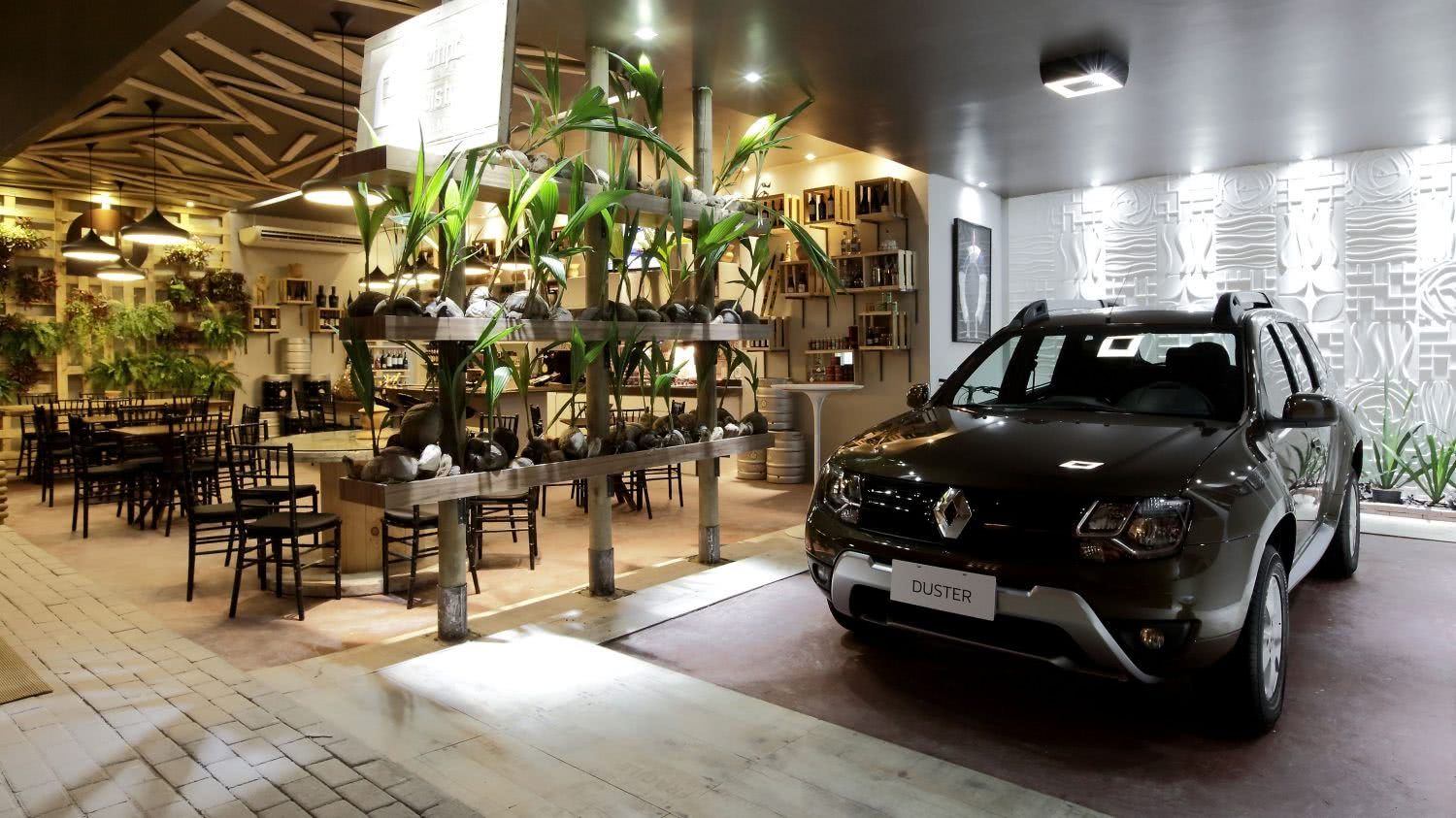
Wooden deck
Image 27 – Wooden decks decorate, but require some care.
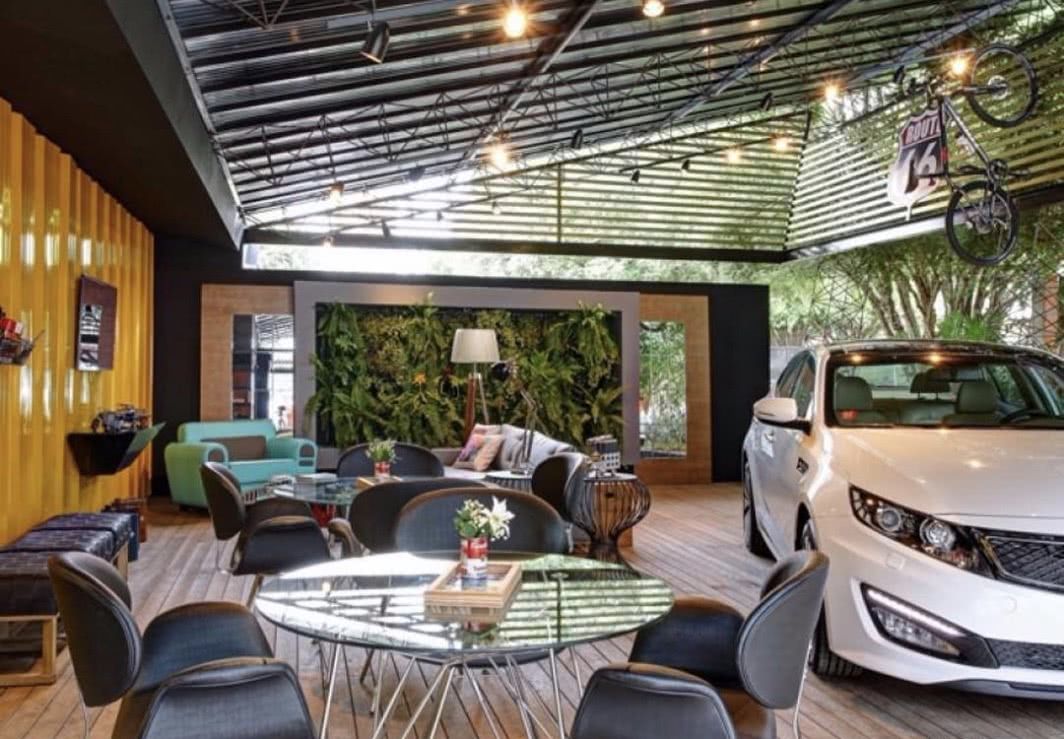
More tips for garage floors
Now that you know the main types and suitable materials to apply to the garage floor, check out more professional tips and get inspired:
Image 28 – Innovate in the format of the smooth ceramic floor.
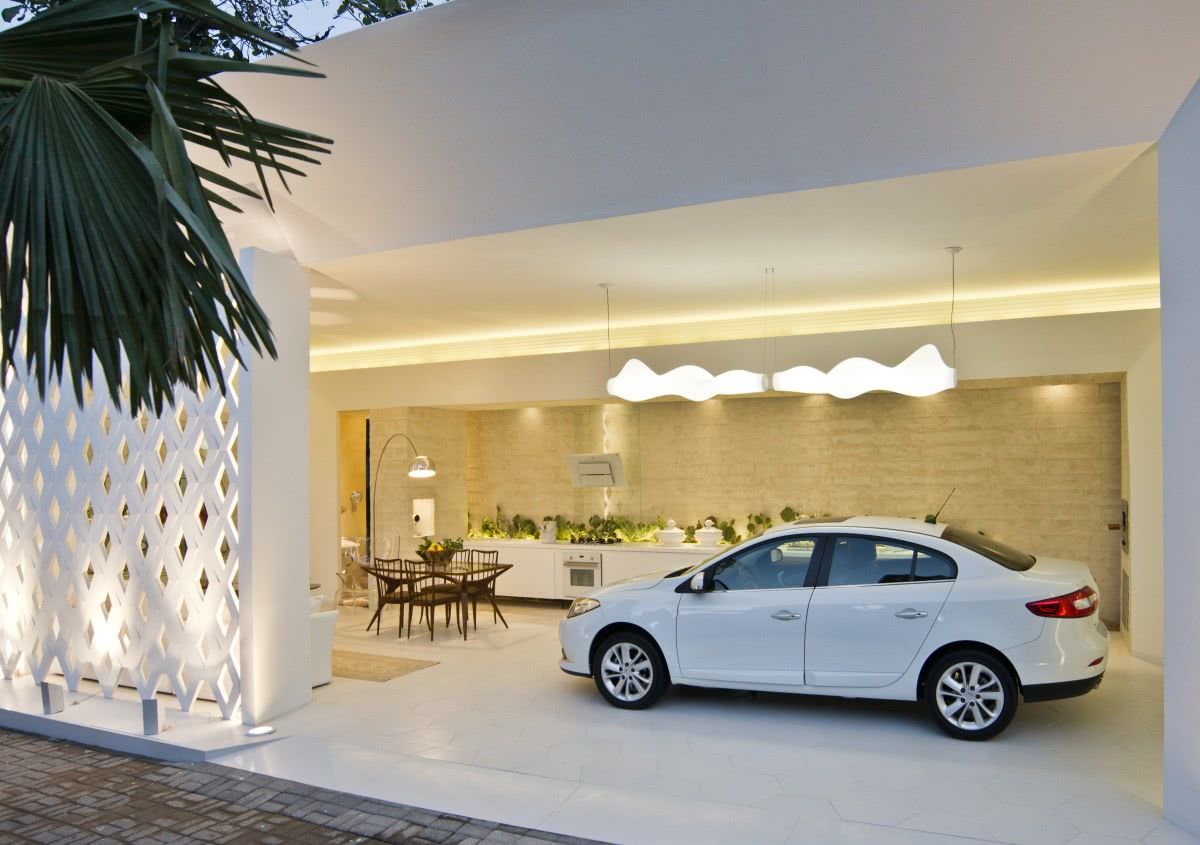
The piece with six equal sides resembles the shape of a beehive and became a trend in the field of decorative coatings. It is a modern alternative to escape from traditional formats, resulting in a different decoration for those who are adept at geometric shapes.
Image 29 – You can define the area of the car space with a different color than the rest of the floor.
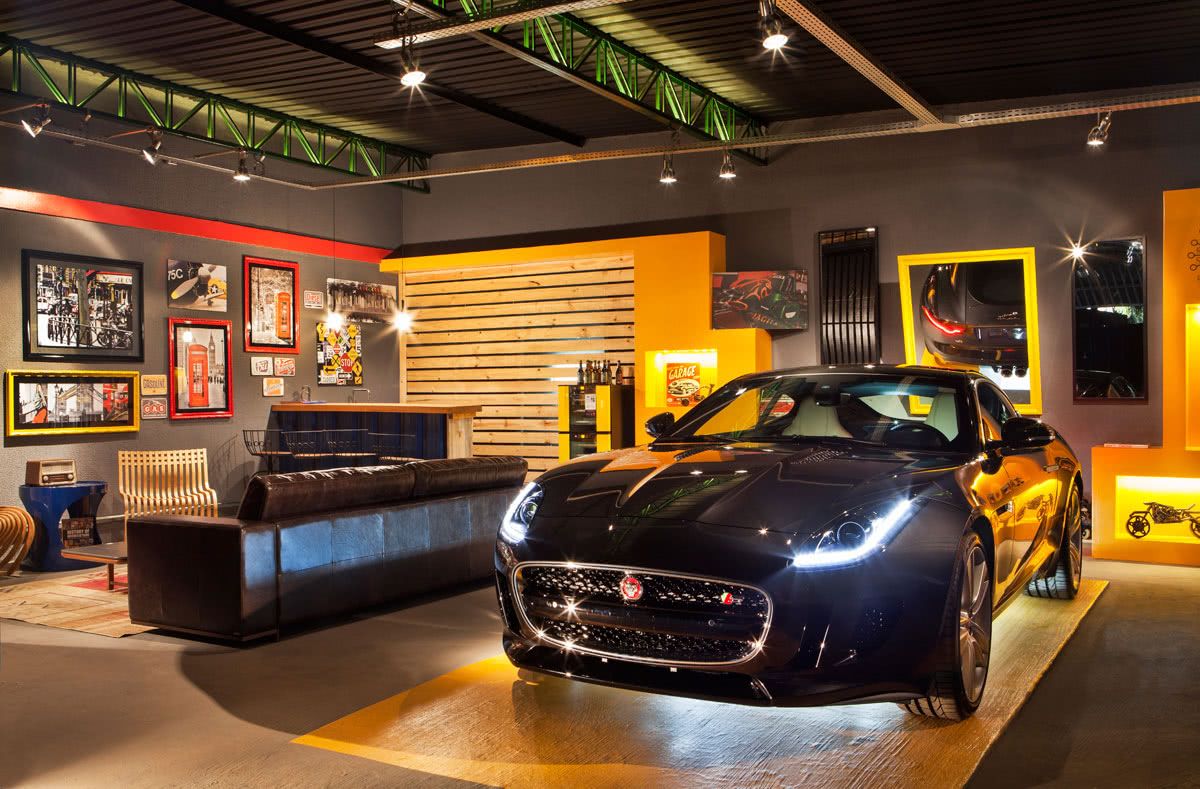
Sectoring the space is the best way to visually mark the different functions that an environment offers. As this garage has an integrated living area, erecting a wall would not be the best option, as they cause the impression of a smaller area. So the painting in this project shows how to solve problems of spaces and aesthetics, without needing a major renovation.
Image 30 – Opt for non-slip floors.
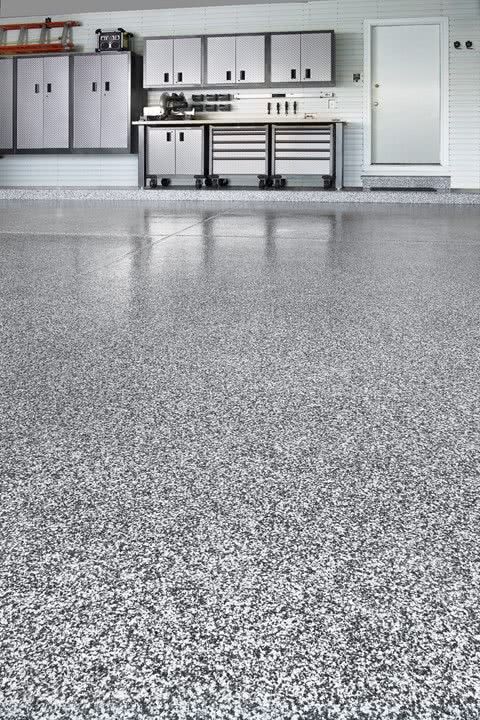
They prevent domestic traffic accidents, especially on rainy days where moisture ends up entering the garage.
Image 31 – The painting in latex paint allows drawings and an incredible game of colors in the garage.
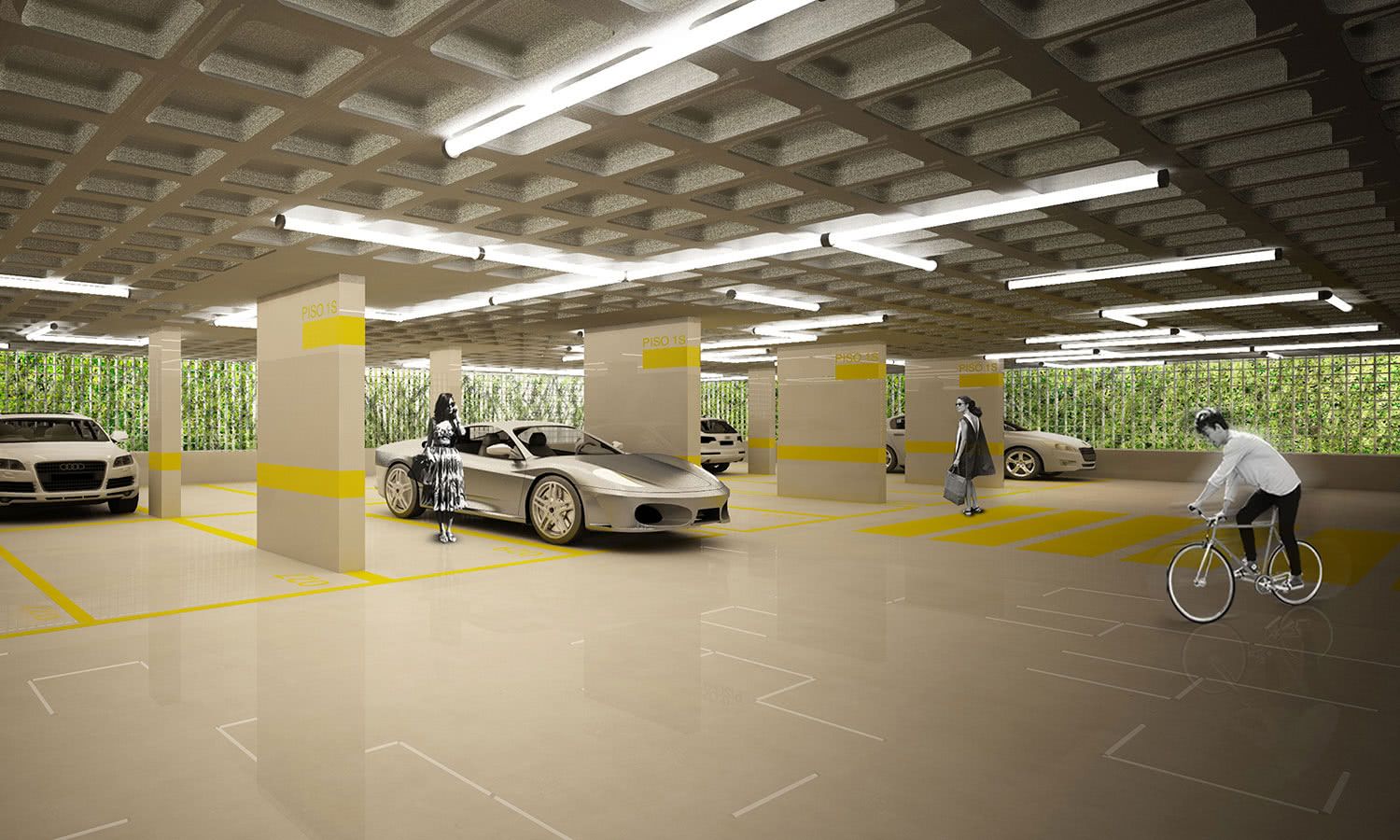
With the concrete base, the painting with the specific paint must be applied on the correctly burnt subfloor, and it must be well prepared. It is widely used for signage in residential and commercial garages.
Image 32 – Garage with rubberized ceramic floor.
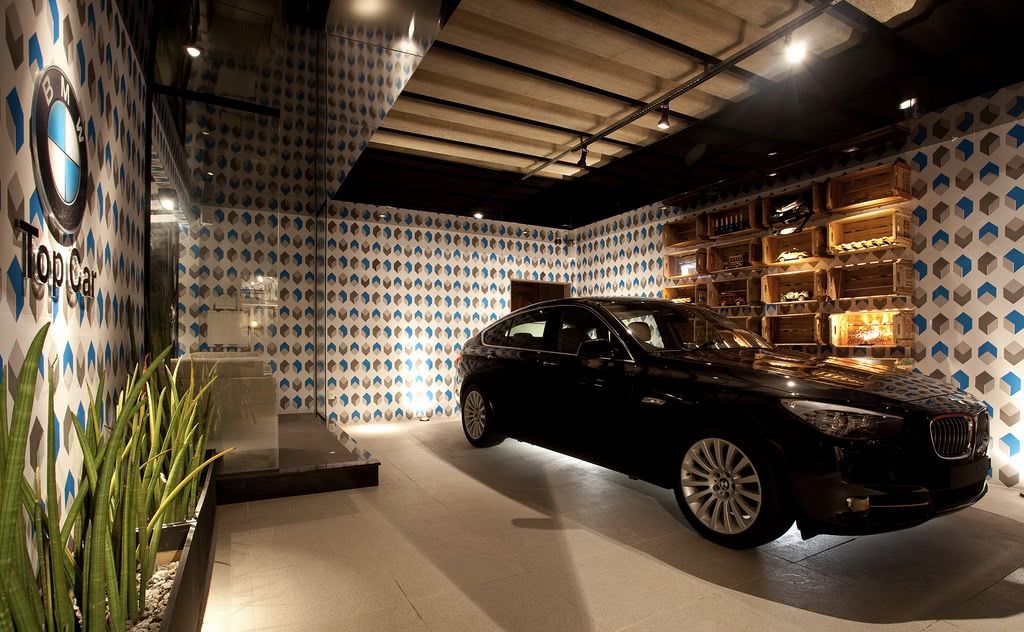
This ceramic floor, unlike the traditional one, is quiet and non-slip. Its biggest problem is the cleanliness, as the traces of oil from the car tend to accumulate on this type of floor. So it is ideal in residential garages with integrated environments.
Image 33 – Garage with concrete floor.
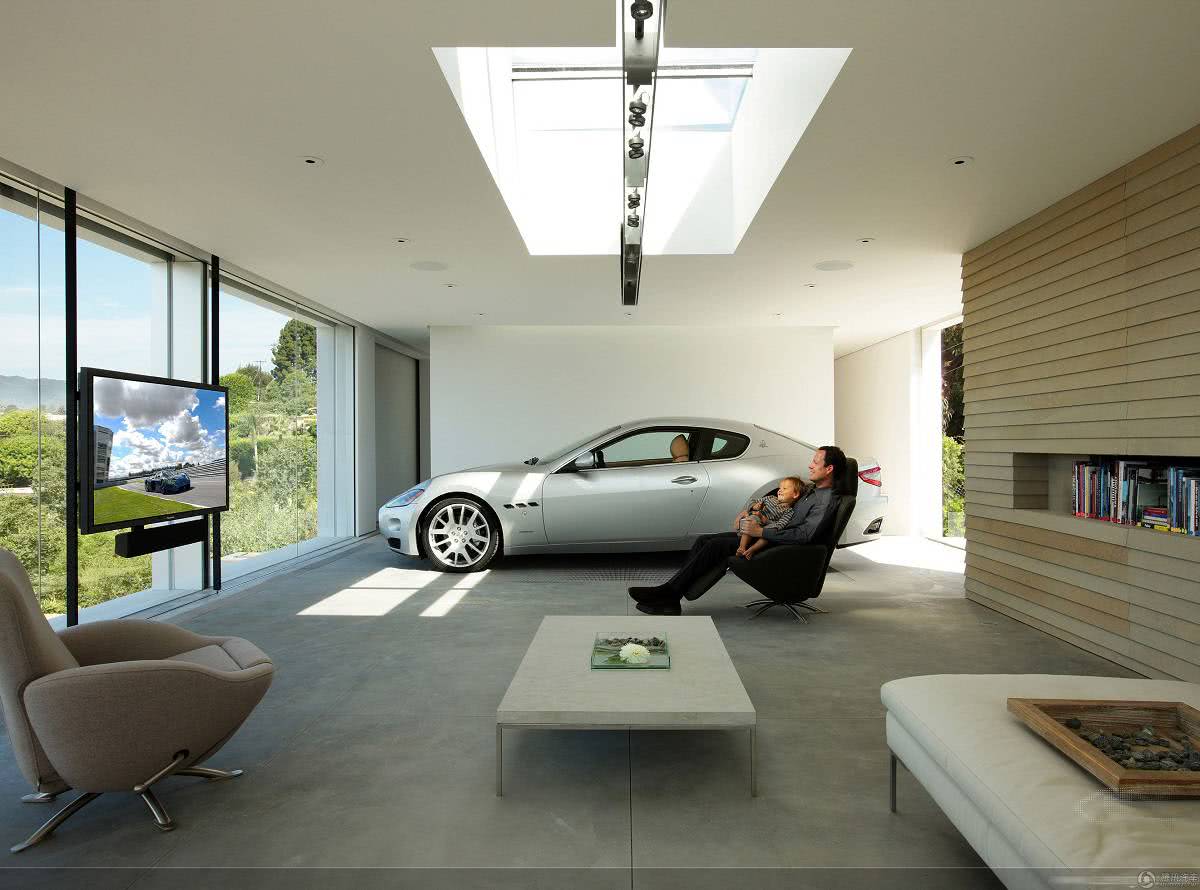
The concrete floor has a great cost benefit, because besides being an inexpensive option it offers a neutral look and has the advantage of being able to receive a new coating on it in the future.
Image 34 – The same pavement floor can be used in the external garage area.
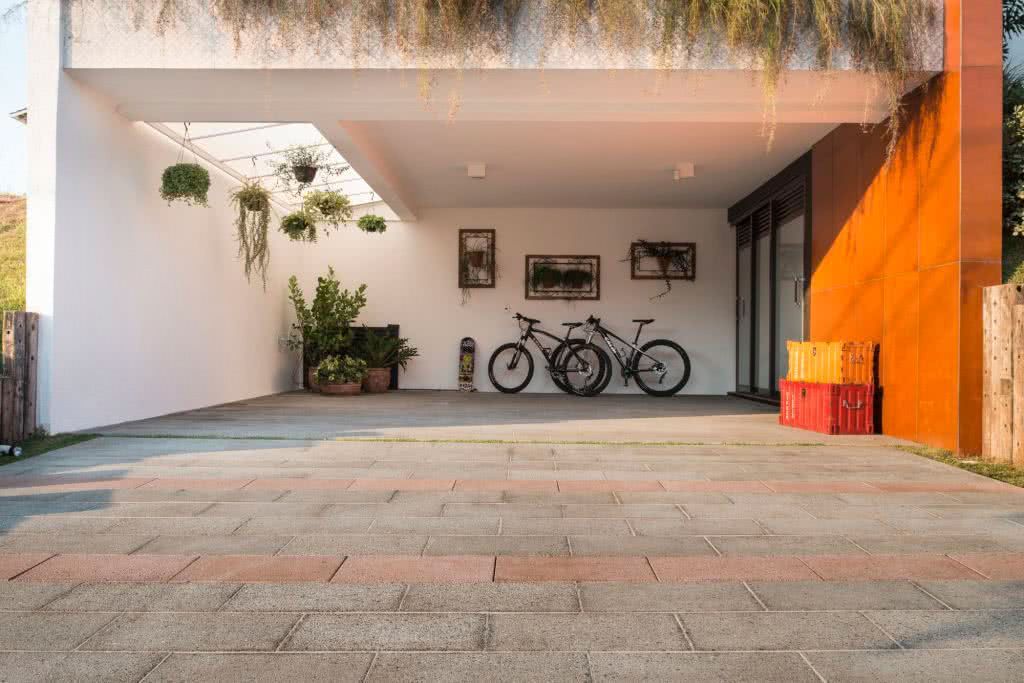
This can be done so that there is harmony between the chosen materials. Landscaping is fundamental in the construction of a residence, so its function is to integrate spaces naturally, interacting with architecture and its accesses.
Image 35 – Delimit the areas with a painting on the floor.
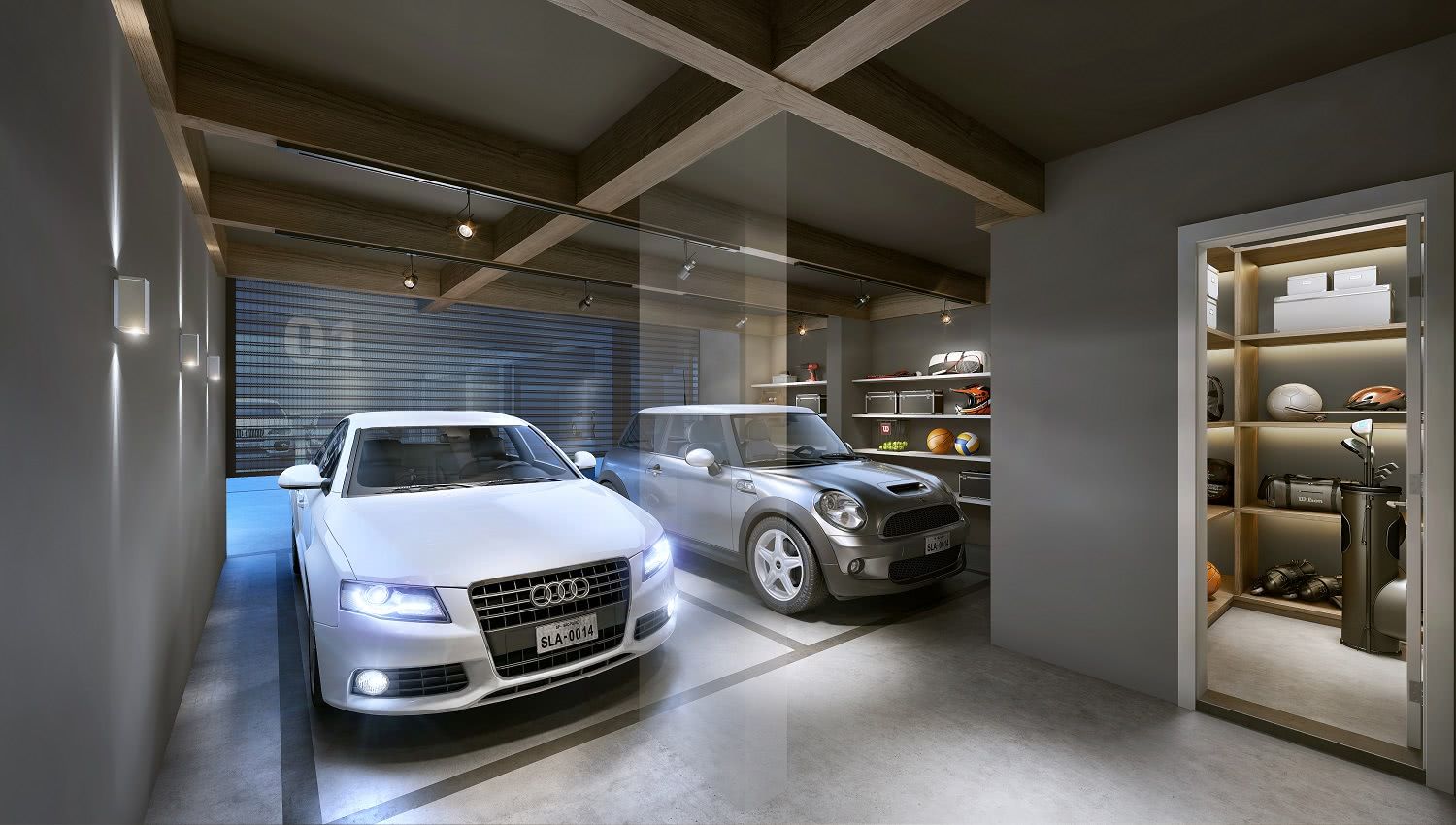
For this application, the floor must be cementitious and it is essential to observe the curing time of the concrete (if the floor is new), clean the place that will receive the paint well as there should be no cracks or imperfections.
Image 36 – In this project, gray invades construction and landscaping.
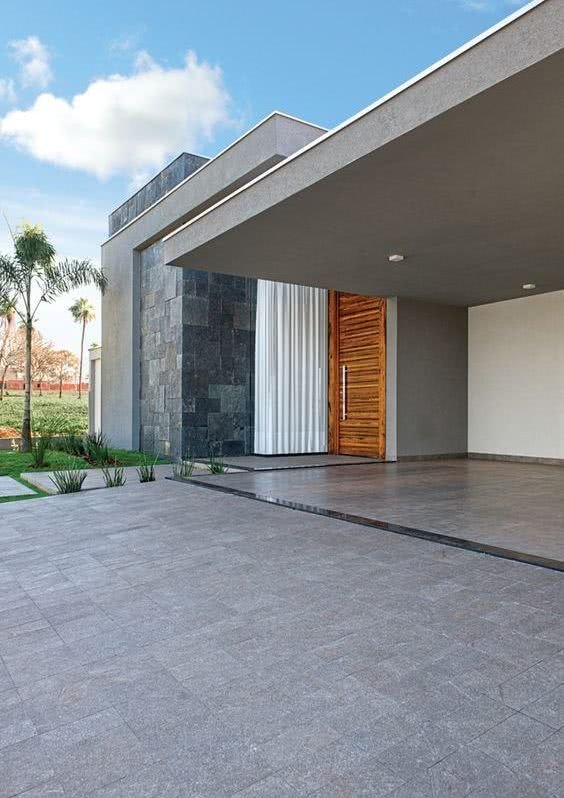
The concrete floor is resistant, easy to maintain, recommended for external or open garages on the side and is a durable material, as long as it is well applied.
Image 37 – Combine the garage floor with the outside of the residence.
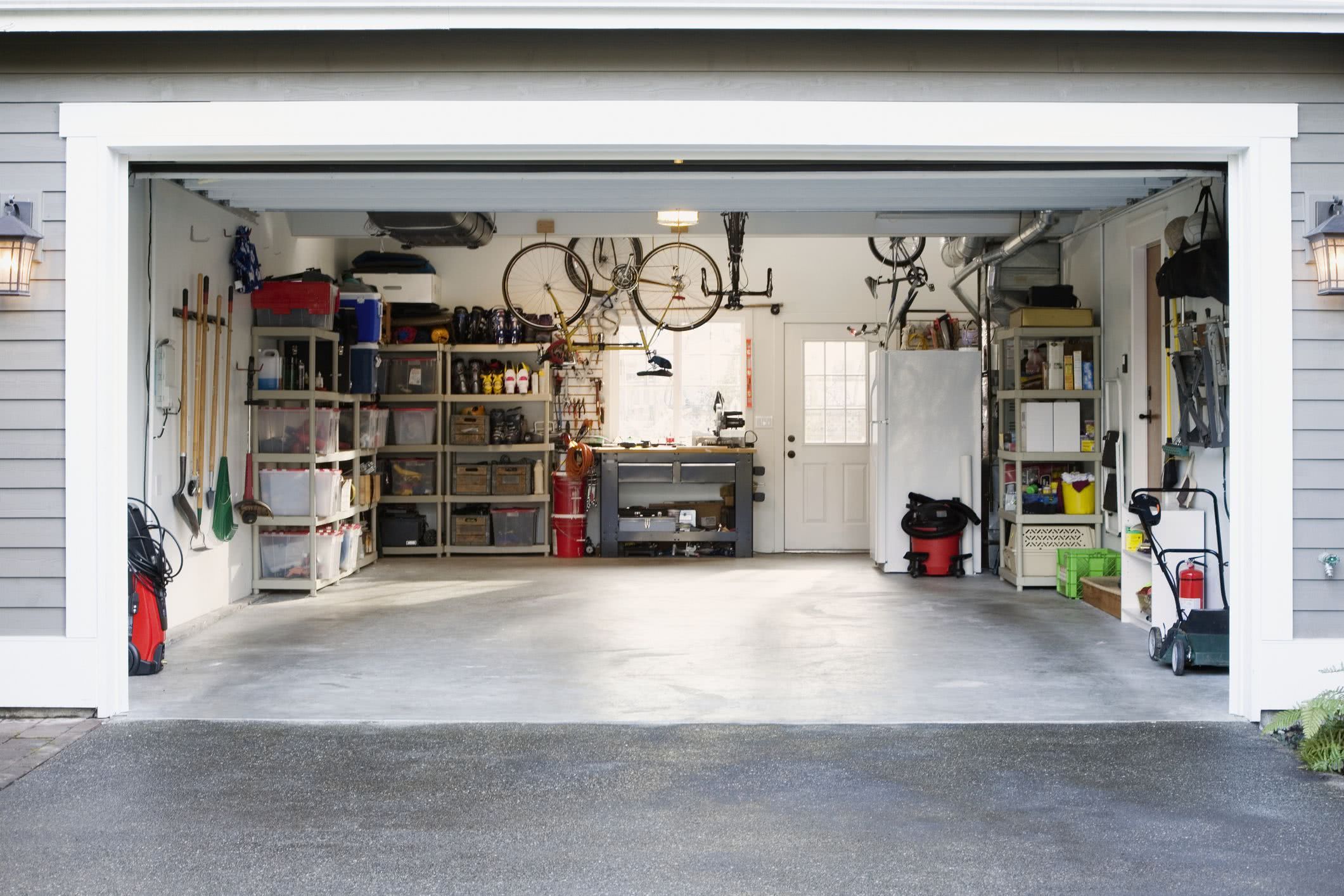
Image 38 – Look for a clean ceramic floor to have a modern look in the garage.
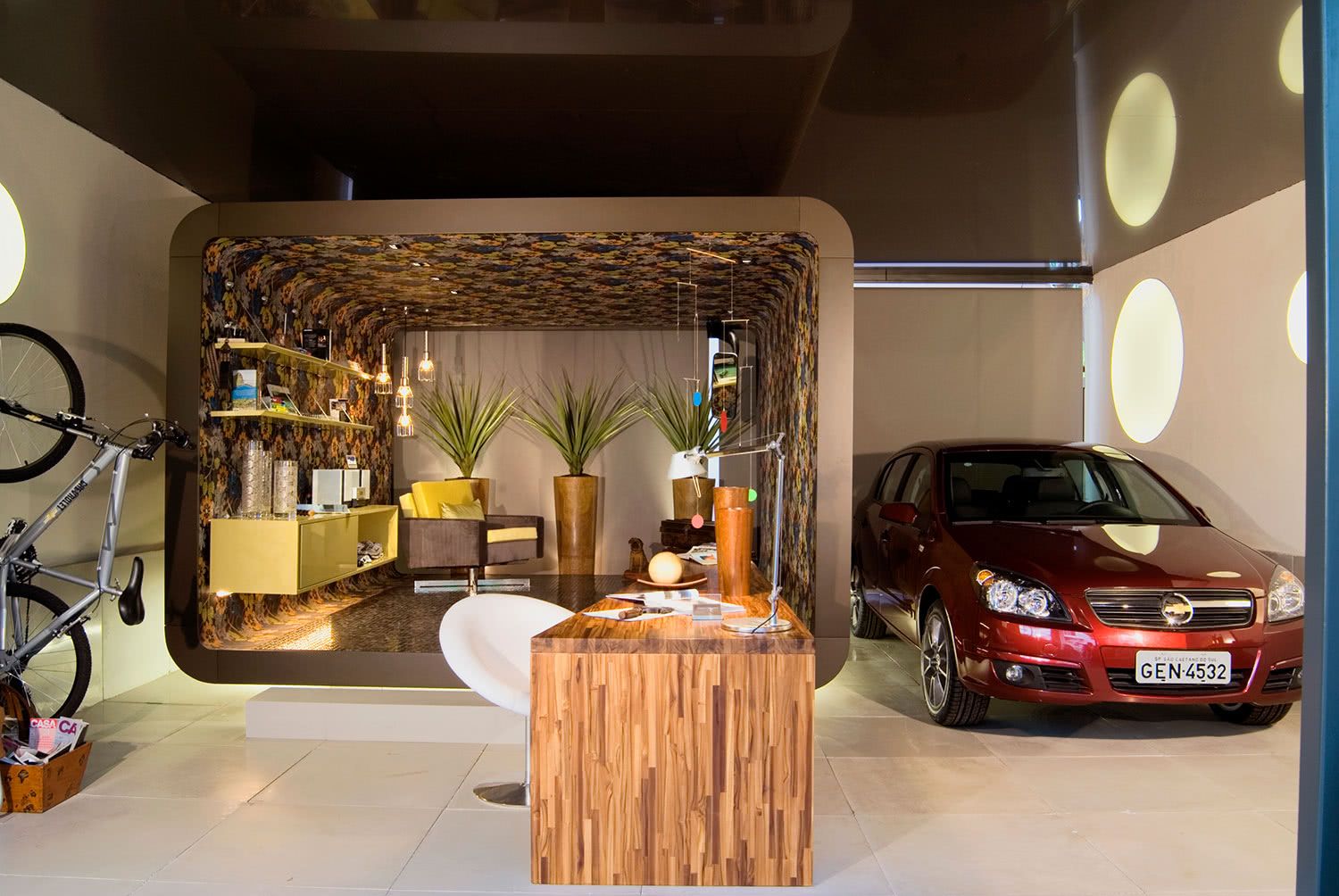
Image 39 – Solution for garage integrated to the lounge.
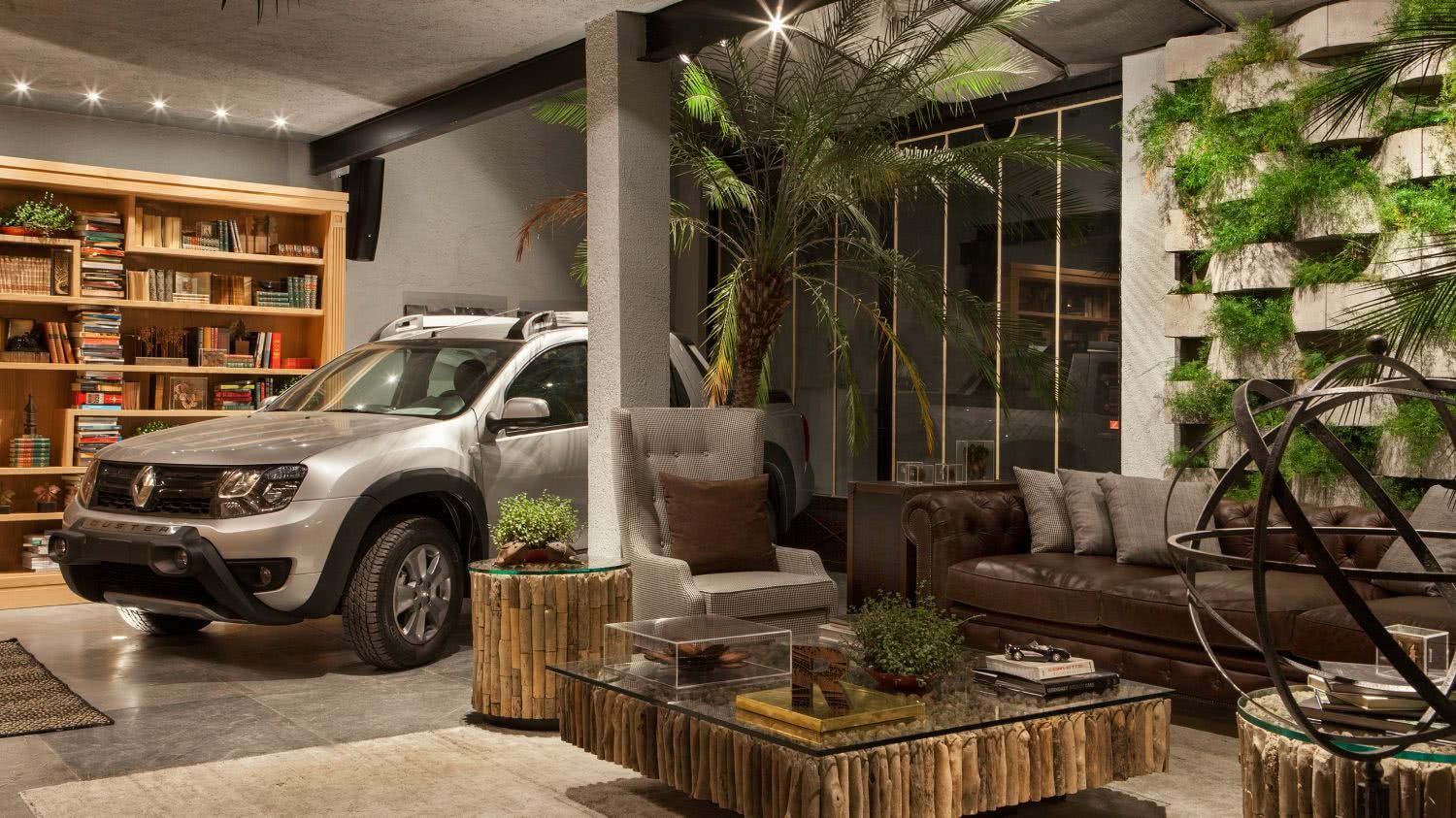
Carpets are great decorative items to take the garage air out of the room, and even offer a more cozy atmosphere to the place. In addition, they delimit the space of the car space and circulation.
Image 40 – The diversity of the designs of the interlocking floor.
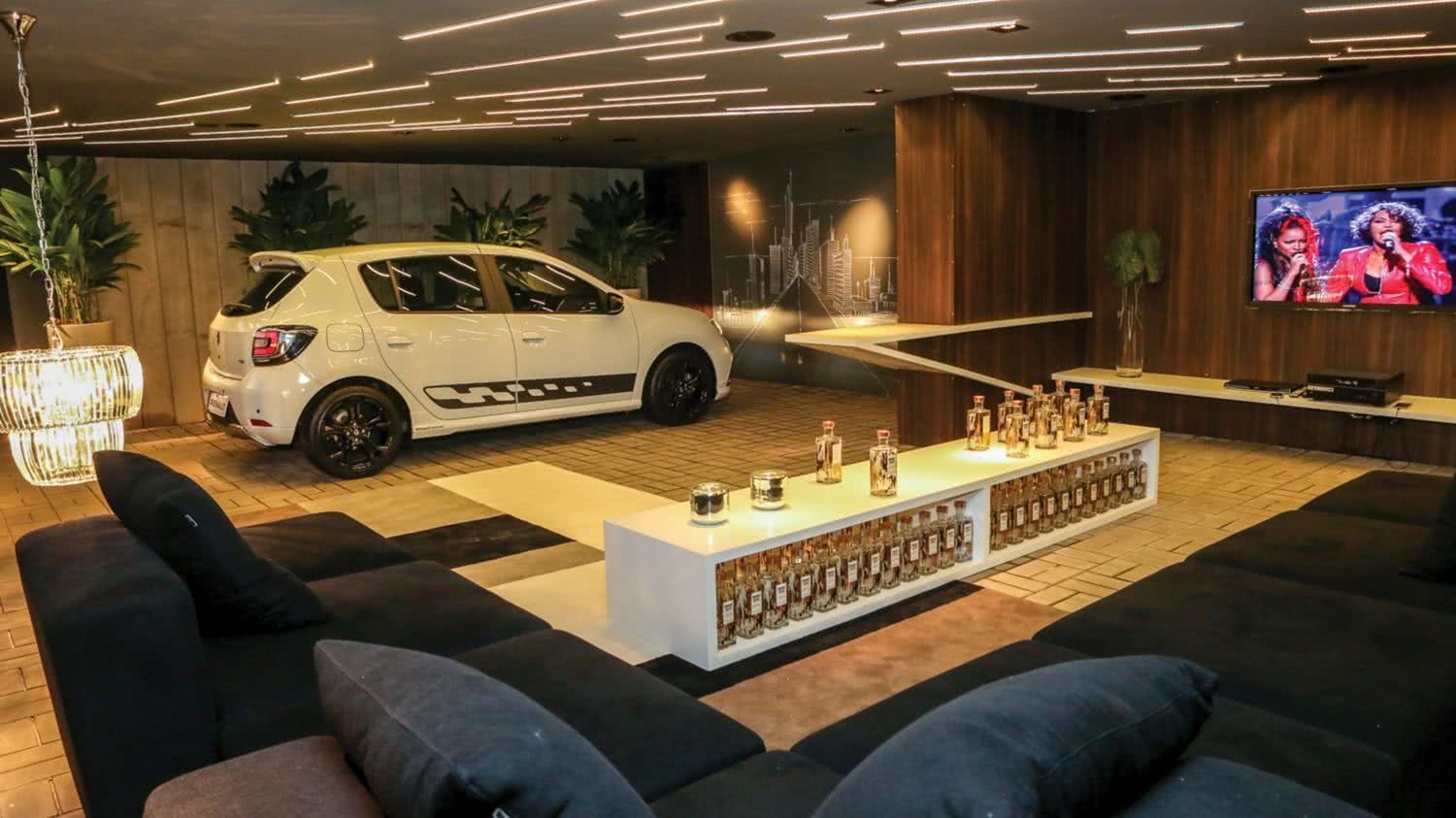
The cool thing about the separate pieces is the infinity of compositions that can be made. It can be positioned horizontally, vertically, diagonally, forming different pages on the floor. In this case, it was inserted horizontally and vertically, forming a pattern moving to the floor.
Picture 41 – The beige floor with grit texture brings security, a light and pleasant aspect to the space.
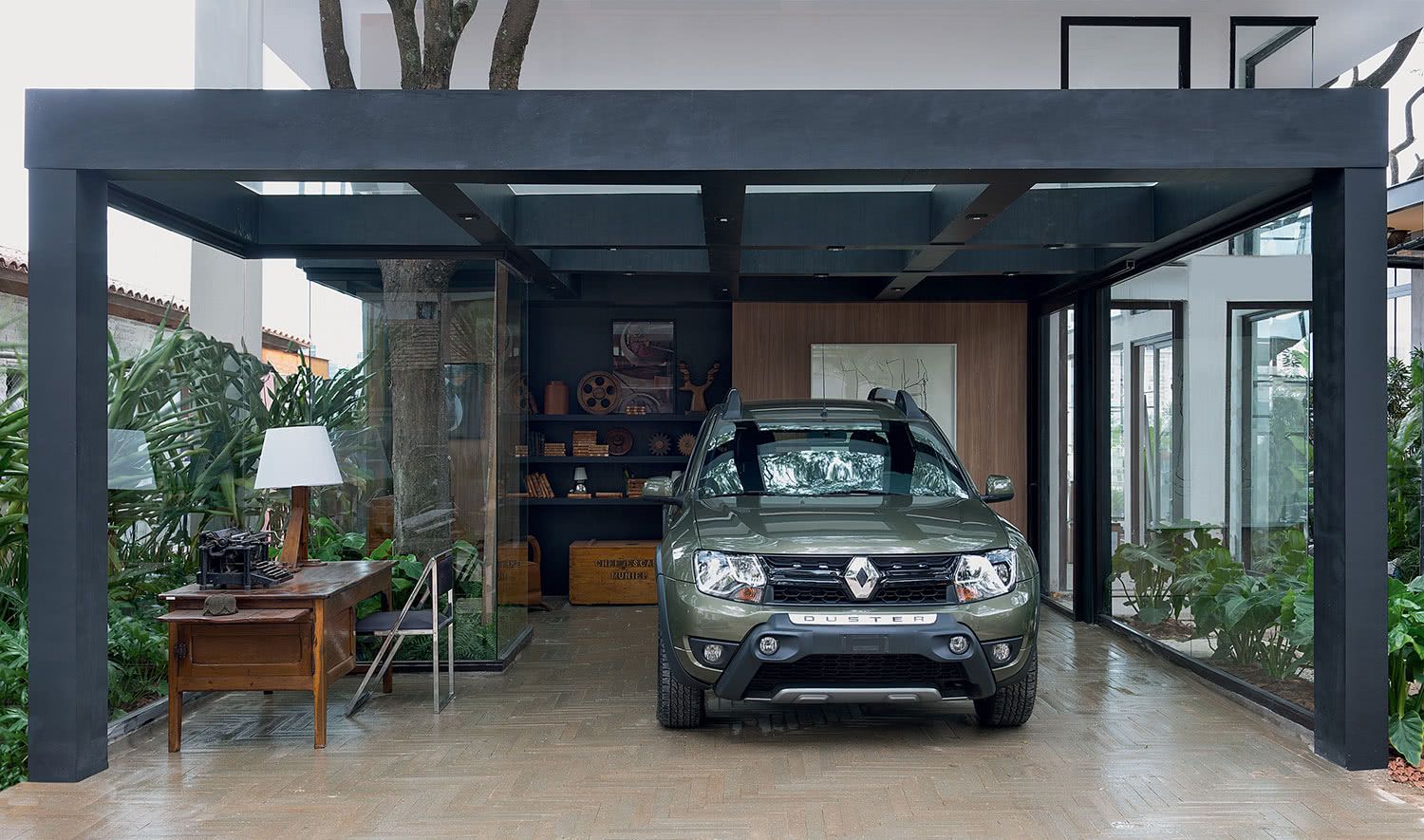
This floor is ceramic with an enamelled finish, offering shine to the surface and enhancing space, due to its beige color. Its granulated texture leads to greater safety for wet areas and in the garage, it supports large volumes.
Image 42 – Play with the tone on tone in the garage decoration.
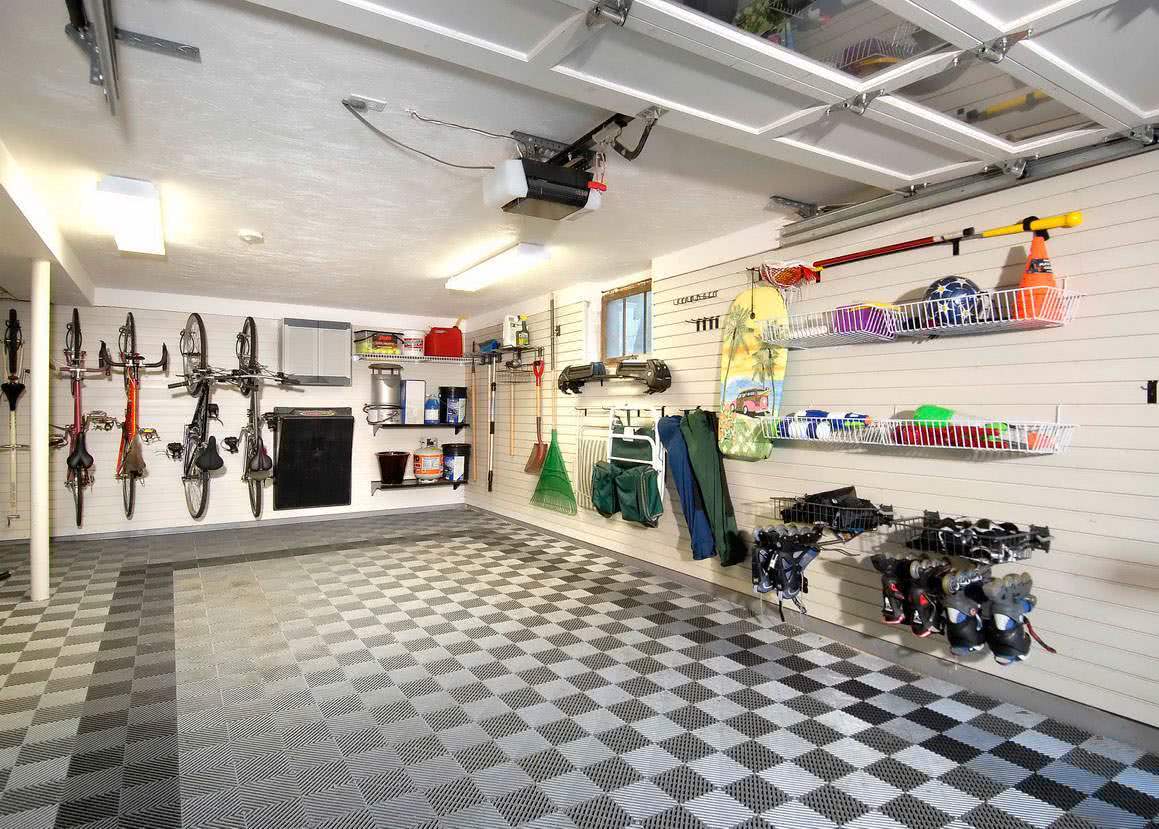
Image 43 – Concrete floor with burnt cement finish and signs.
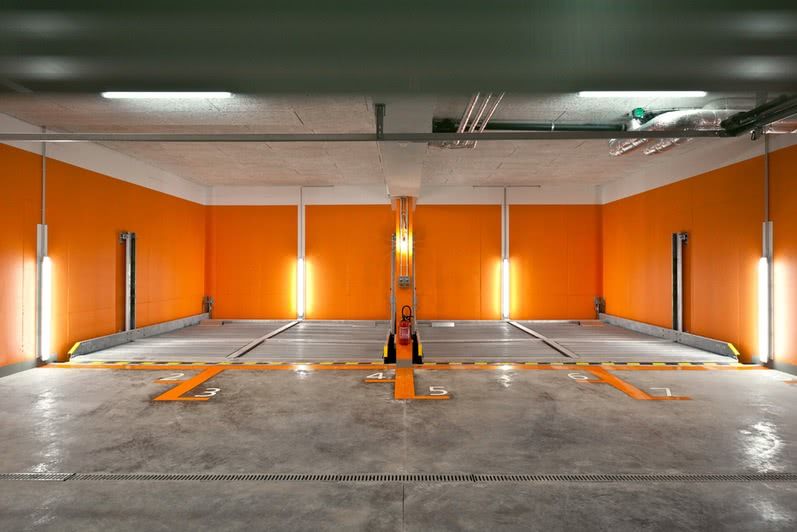
Image 44 – Combine the same material to cover the garage floor and walls.
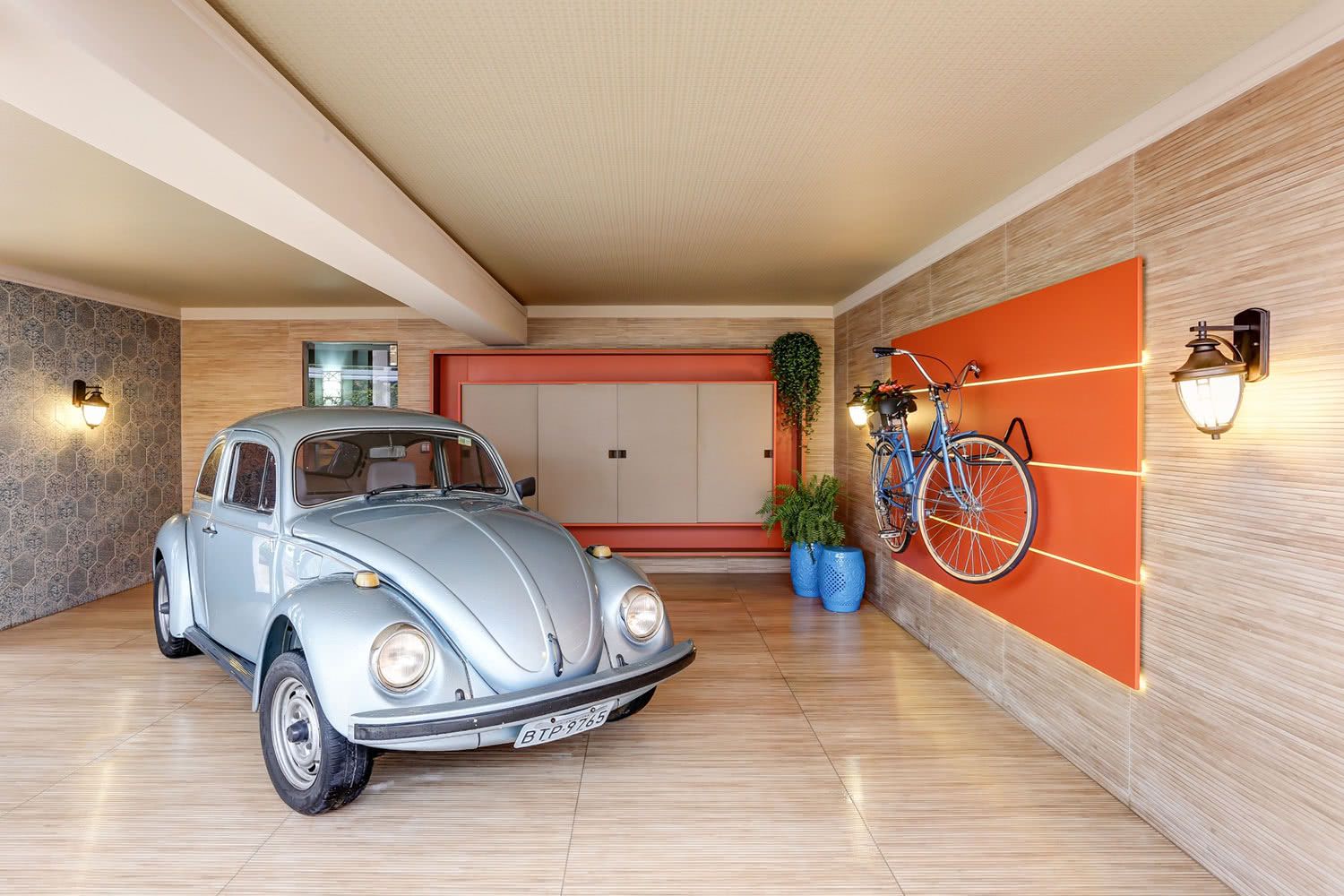
Image 45 – Integrated garage with living space.
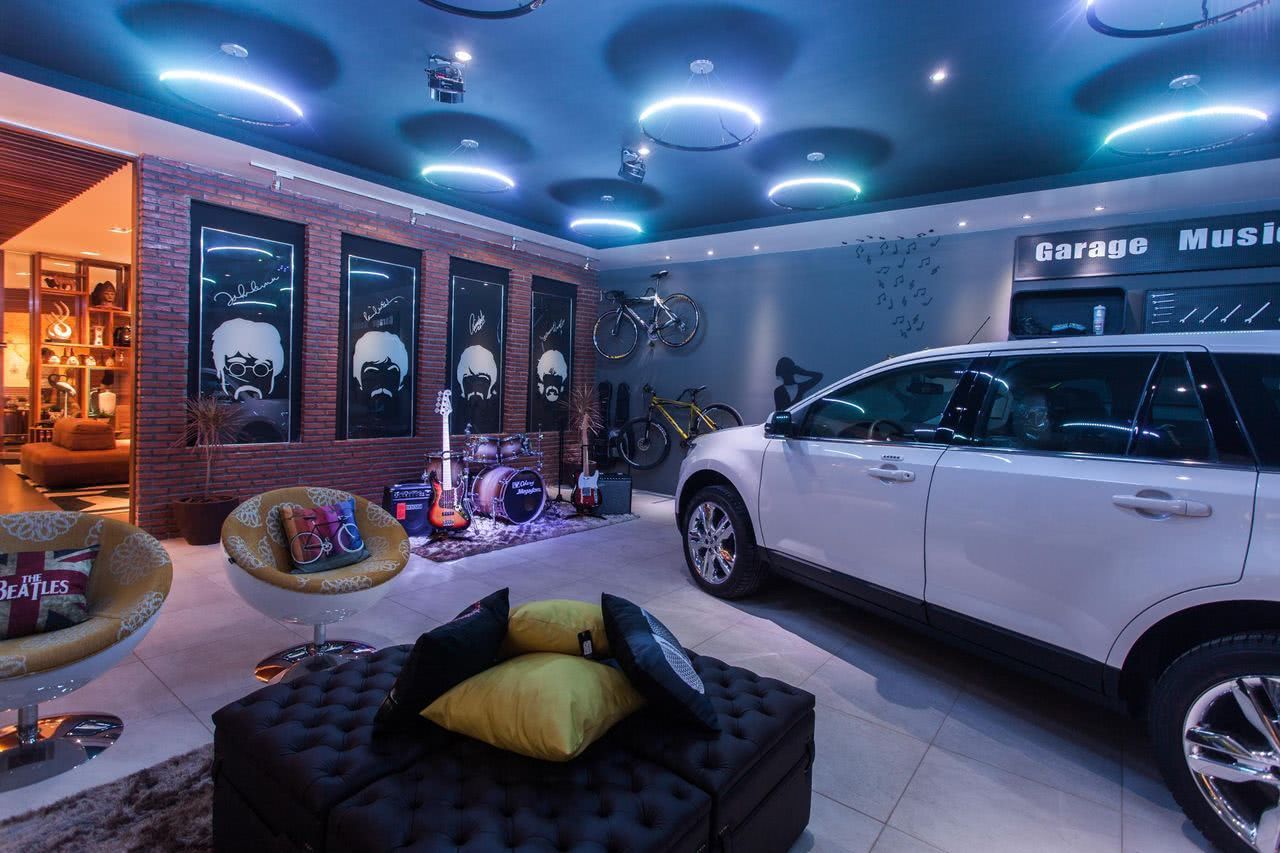
Image 46 – One of the disadvantages of ceramics is the noise caused by the friction of the floor and the car tire.
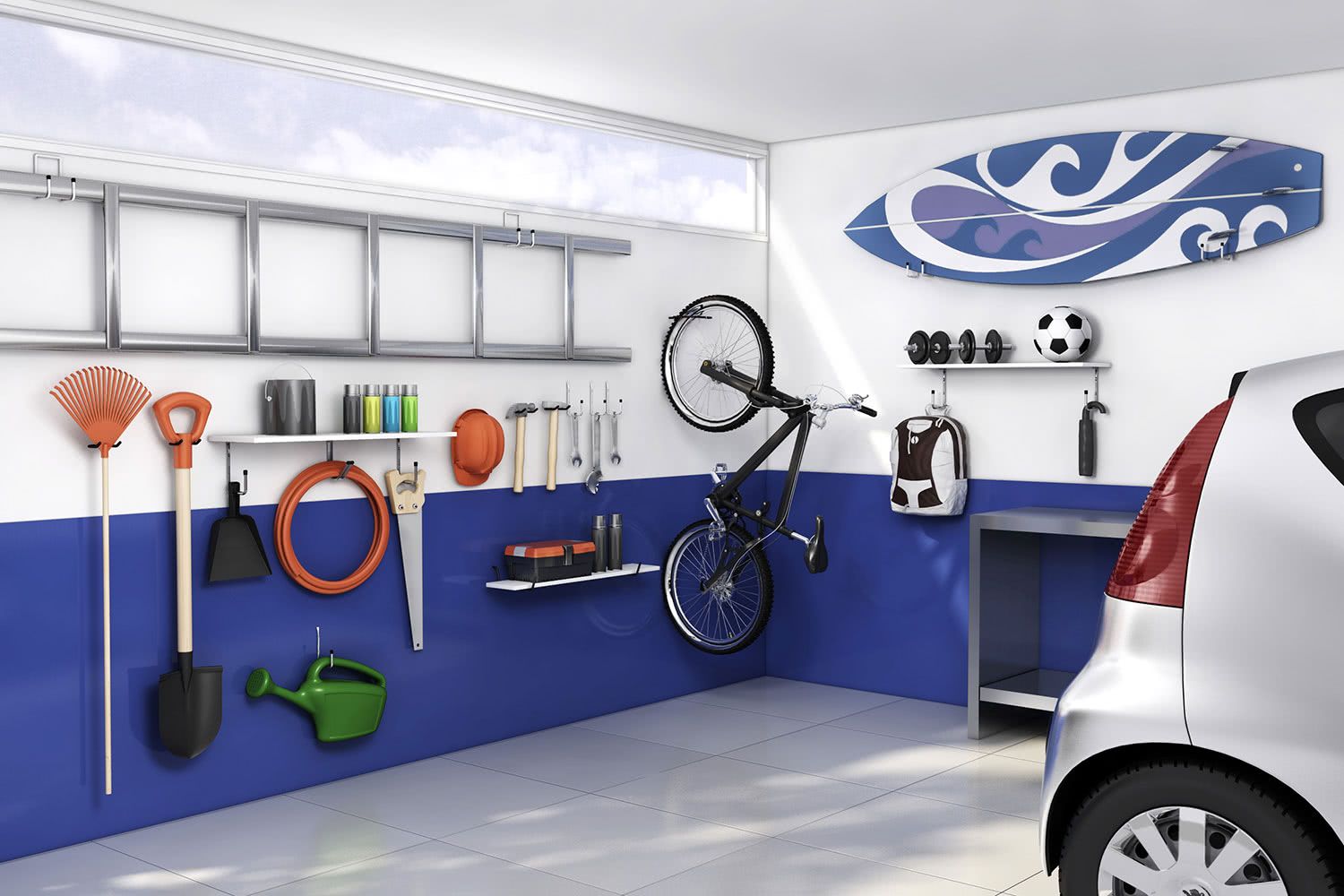
Image 47 – Delimit the vacancy area with a galvanized steel floor layout.
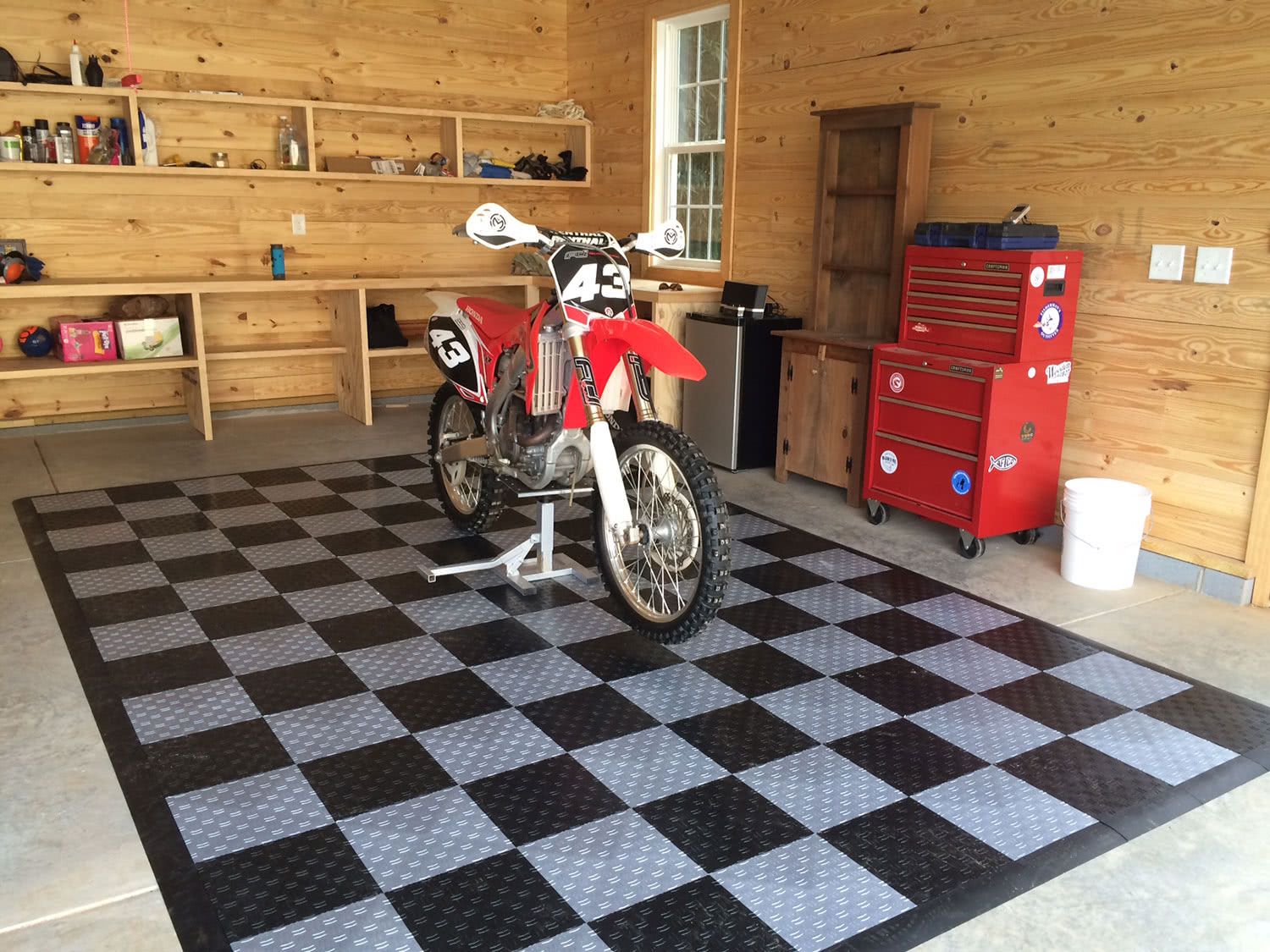
Image 48 – The piece with a larger pattern is ideal for large garages.
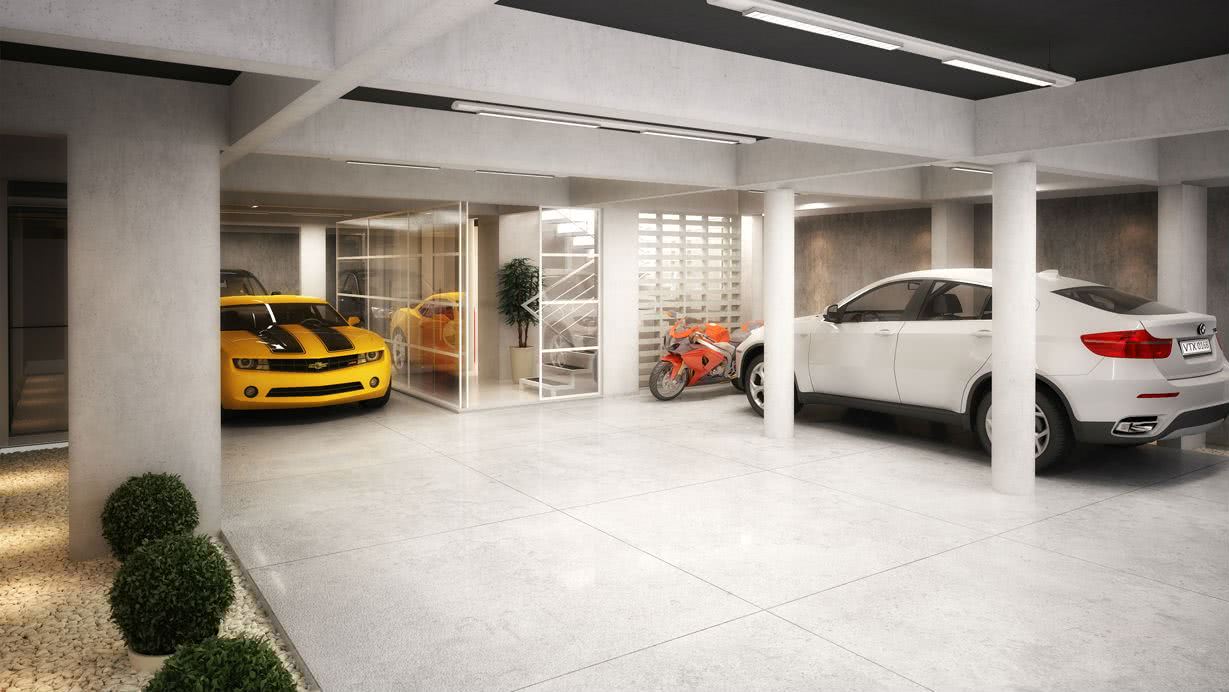
Image 49 – Garage with gray tile floor and red outlines.
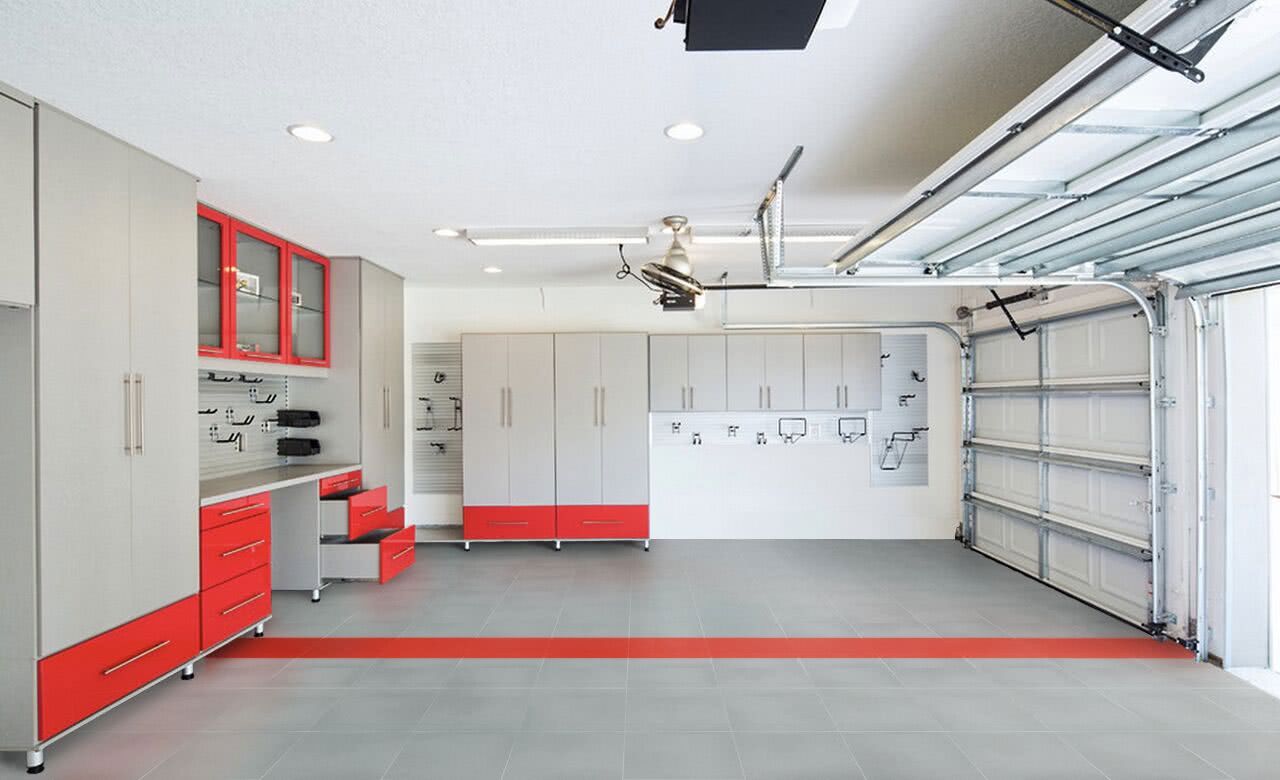
Picture 50 – The modern house has a garage on a higher level, which allowed for more security when choosing a ceramic floor.
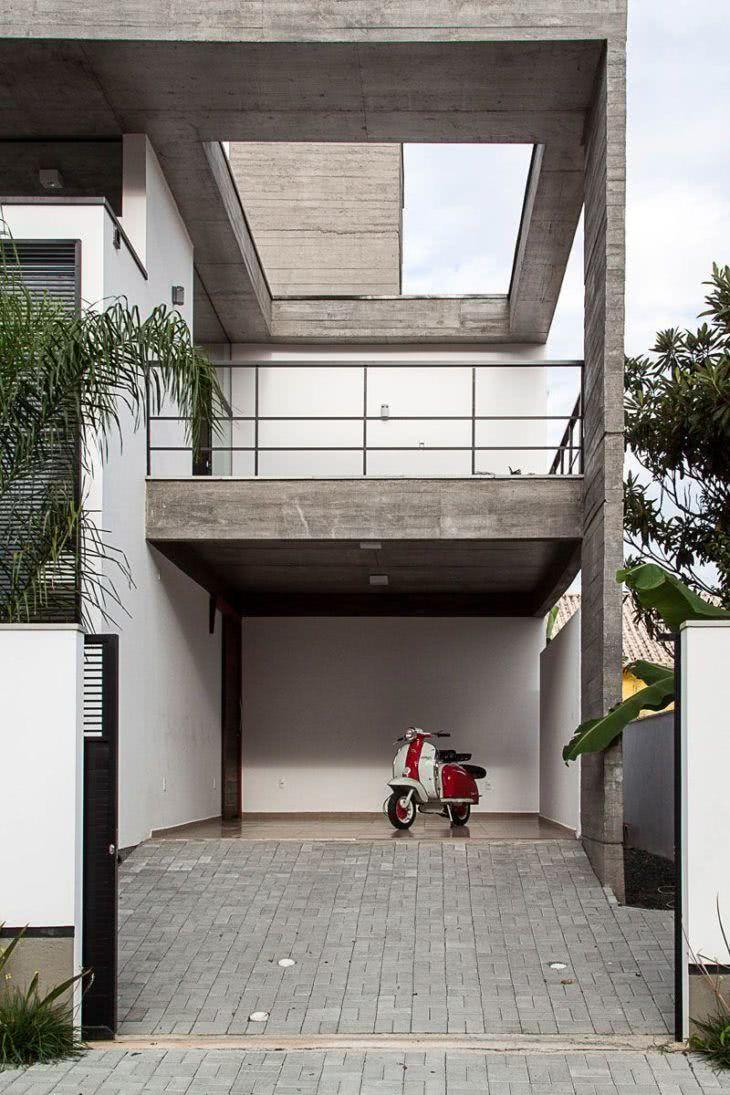
Image 51 – The modular rubber plates are versatile in the garage.
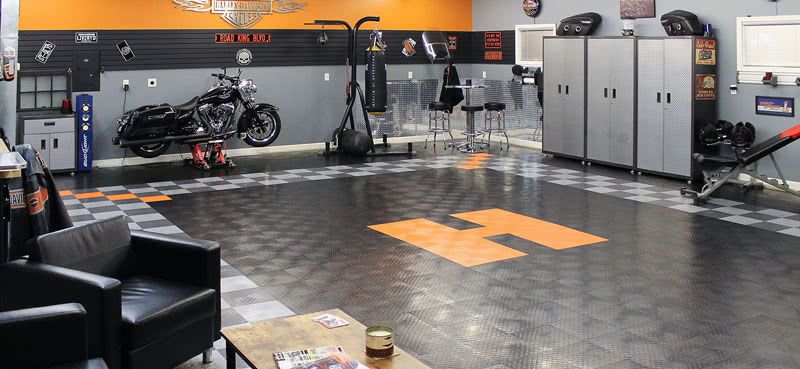
Image 52 – To match the industrial air of the garage, put a floor with resin.
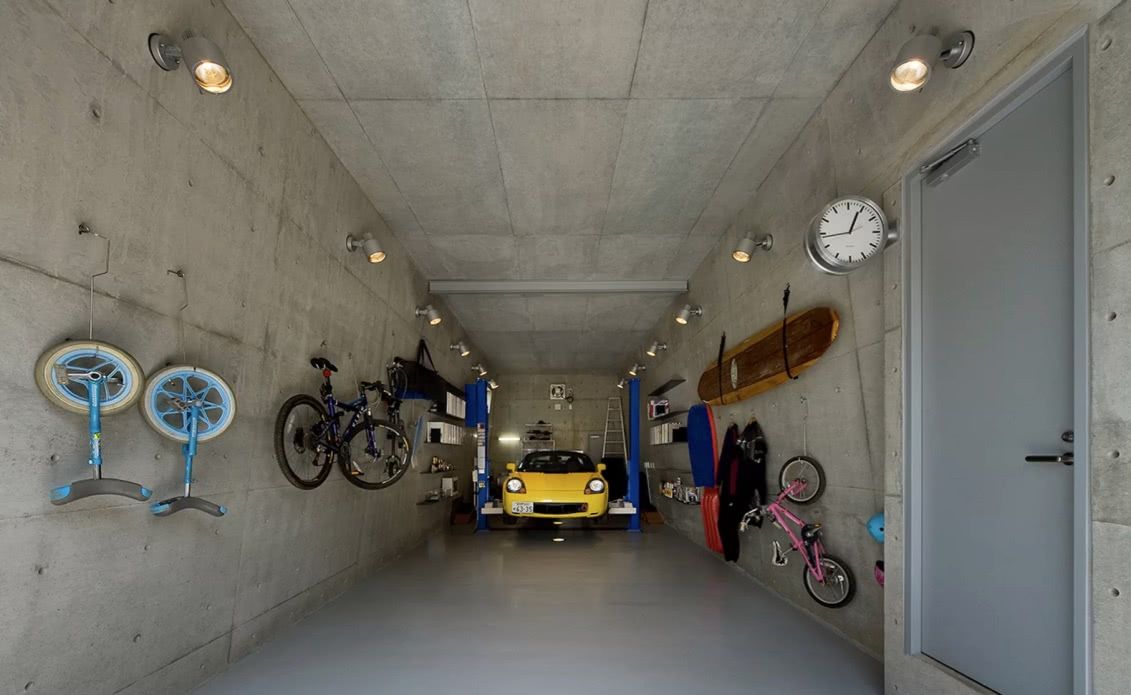
Image 53 – Garage with floor in small blocks of stone.
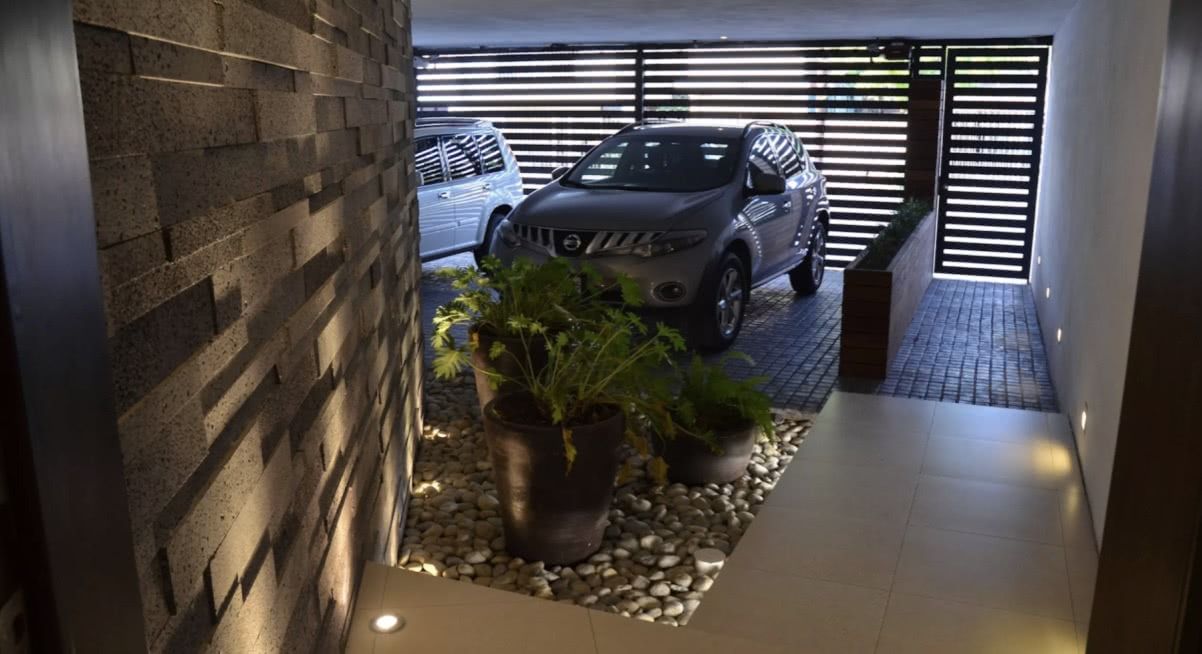
Image 54 – The ceramic can be used in different environments.
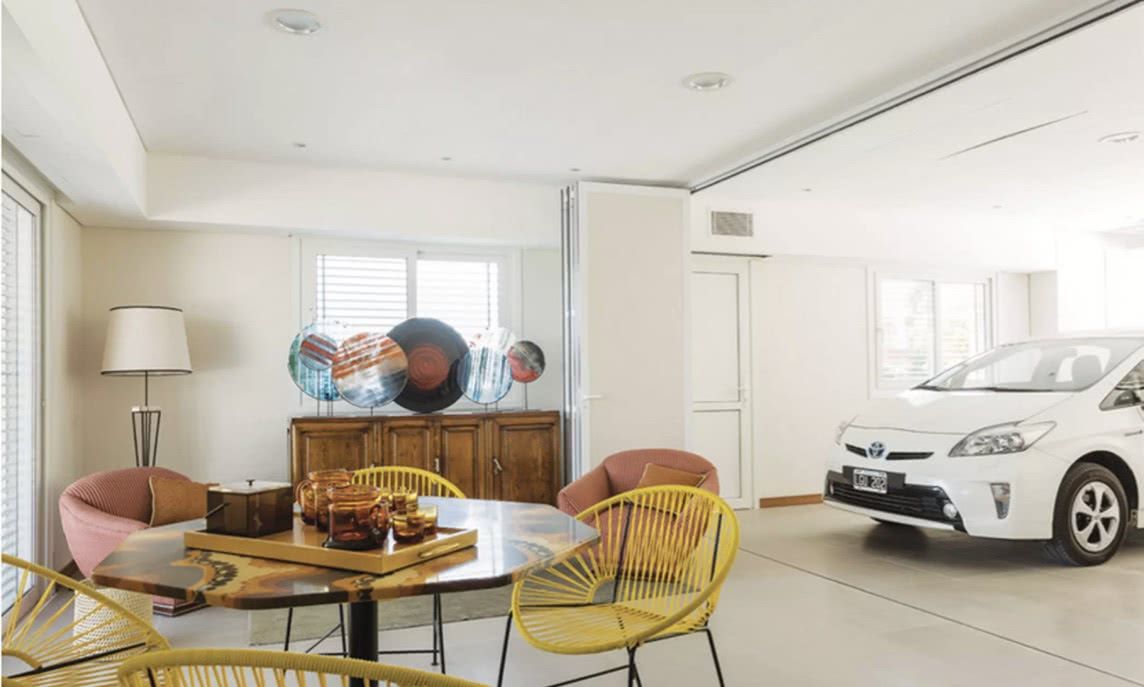
Image 55 – For the open garage, choose the ceramic with rougher or non-slip texture.
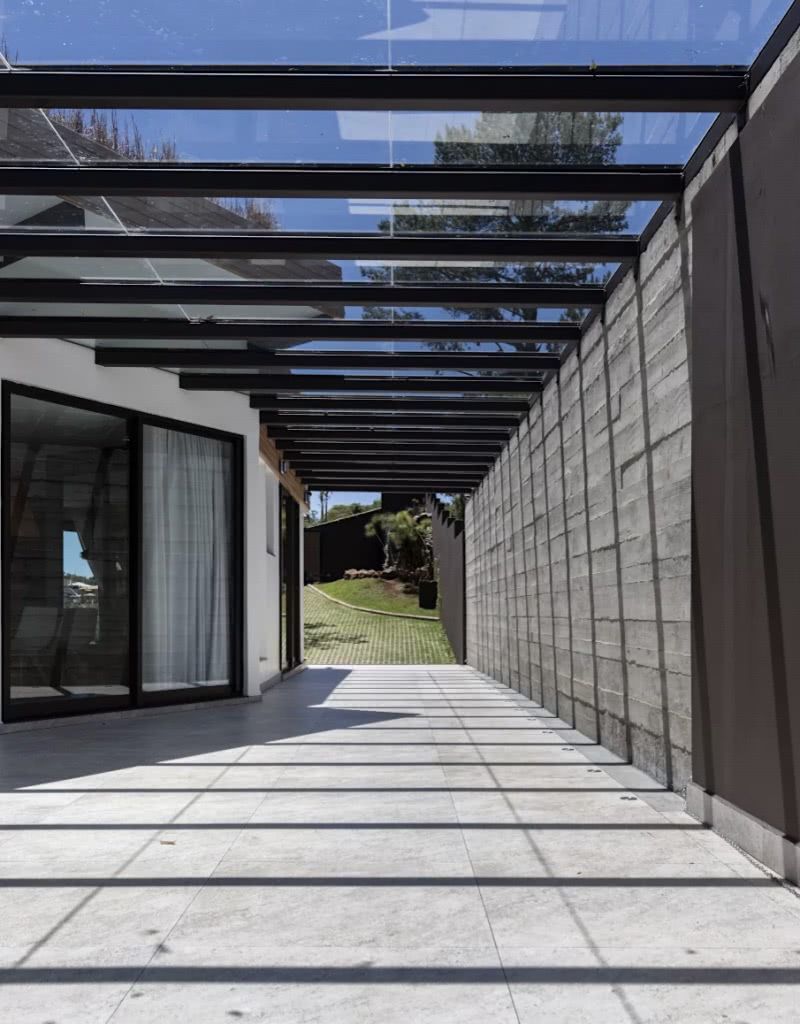
Image 56 – Internal and external garage with different floors.
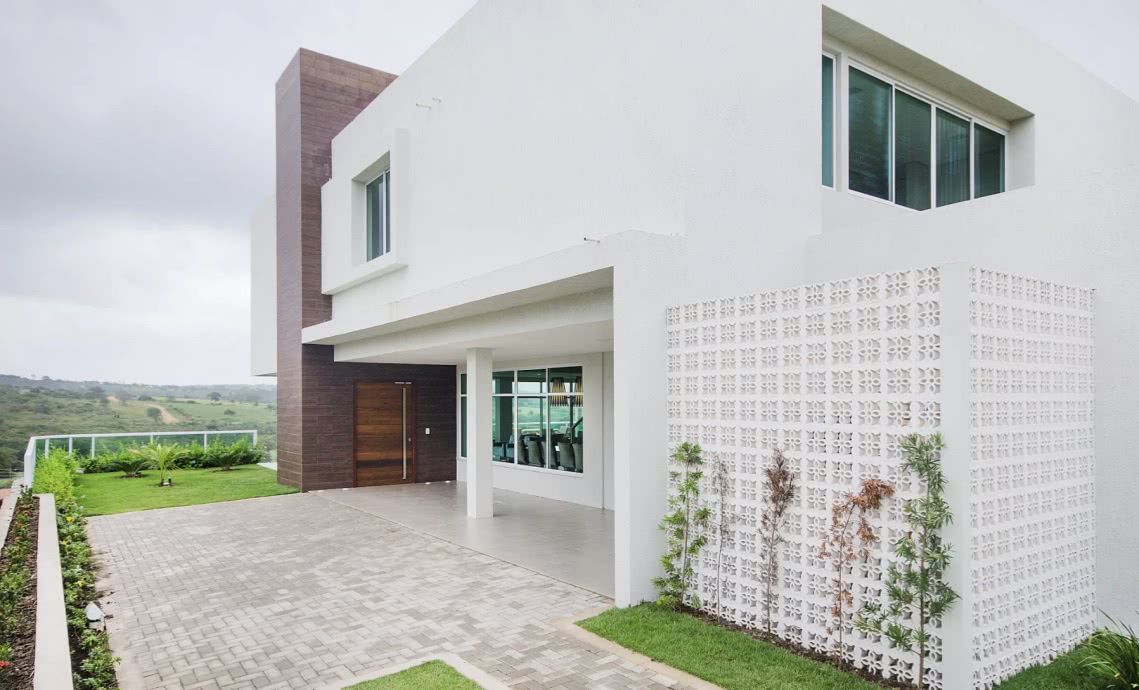
Image 57 – As the garage has a continuity with the sidewalk, maintaining the same floor was a great solution.
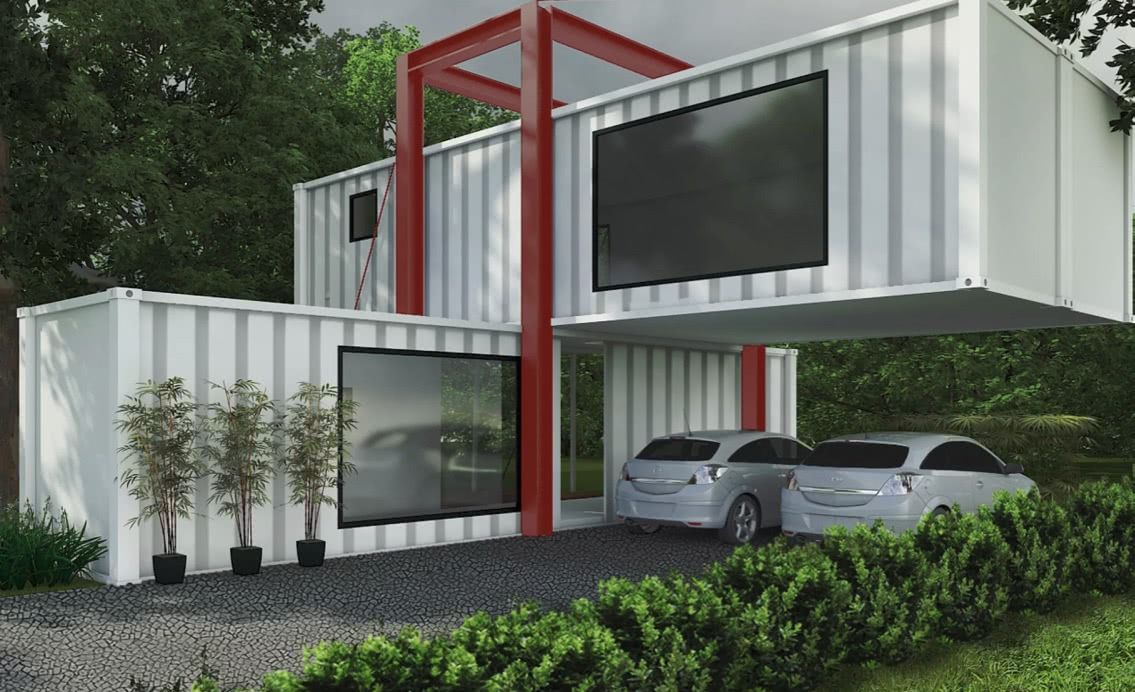
Depending on the architecture, this idea may work very well. If the garage compose with the facade, the look must accompany the choice of materials to be used. Many end up opting for the same material as the sidewalk. Interlocked concrete and natural stones are indicated for the external garage because they are draining and resistant to vehicles. However, because they are porous, car waste is absorbed by the floor making cleaning more difficult.
Image 58 – The ceramic gave a modern look to the garage with pergola.
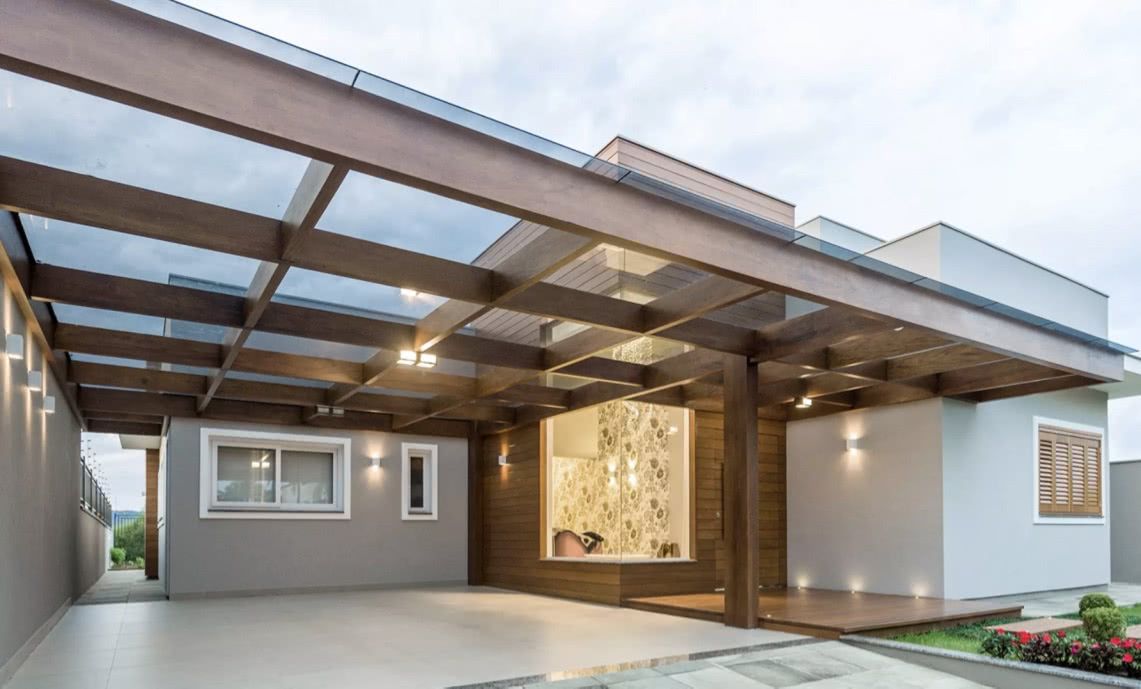
Image 59 – Garage with white ceramic floor.
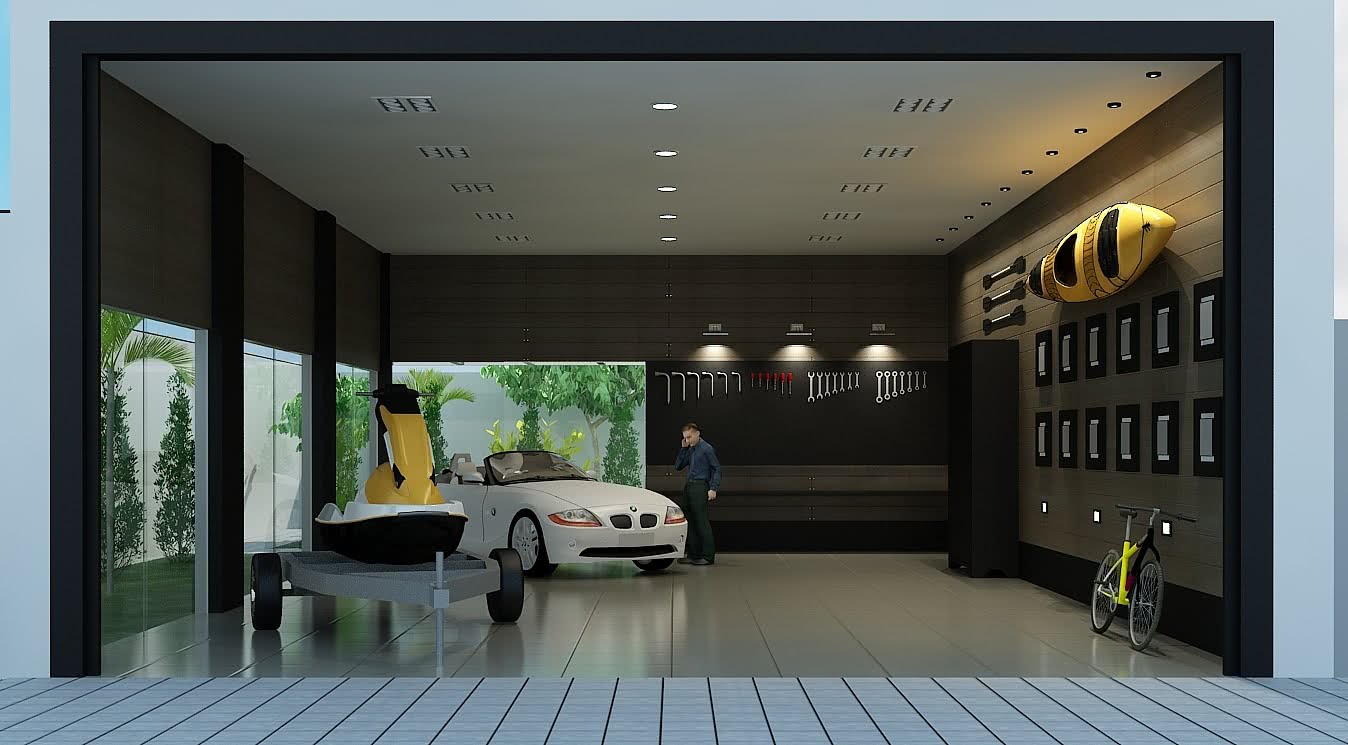
Image 60 – Note that the delimitation of the parking space is made with the change of floor.
